#and beliefs. To better understand OneSelf
Explore tagged Tumblr posts
Text
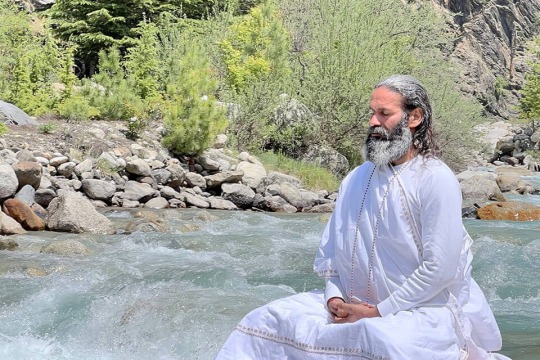
Knowing OneSelf involves introspection, reflection, and a willingness to confront one's own thoughts, emotions, Patterns, and behaviors. It requires honesty and acknowledging one's strengths, weaknesses, values, and beliefs. To better understand OneSelf, it can be helpful to engage in practices such as journaling, meditation, or therapy. These practices can provide an opportunity for reflection and Self-discovery and can help one gain clarity on one's own thoughts and feelings. Ultimately, knowing OneSelf is a lifelong process that requires ongoing Self-reflection and a willingness to learn and grow.
JOIN OUR YOGA COURSES ✅ AND FOR MORE DETAILS 👇🏻✔️ . . CONTACT: +919997224320 . WEBSITE: https://artdvine.com/ GMAIL: [email protected]
#Knowing OneSelf involves introspection#reflection#and a willingness to confront one's own thoughts#emotions#Patterns#and behaviors. It requires honesty and acknowledging one's strengths#weaknesses#values#and beliefs. To better understand OneSelf#it can be helpful to engage in practices such as journaling#meditation#or therapy. These practices can provide an opportunity for reflection and Self-discovery and can help one gain clarity on one's own thought#knowing OneSelf is a lifelong process that requires ongoing Self-reflection and a willingness to learn and grow.#JOIN OUR YOGA COURSES ✅ AND FOR MORE DETAILS 👇🏻✔️#.#CONTACT: +919997224320#WEBSITE: https://artdvine.com/#GMAIL: [email protected]#Hatha#Vinyasa#TherapeuticYogacourses#Therapeutic Yoga workshops#TherapeuticYogaConsultation#Individual(personal) counseling#Tantra#YogaNidra#Vedantic#traditionalknowledgeofMeditationKriyas#yogarishikesh#yogattc
0 notes
Text
Character motivations for fictional characters
1. Revenge: Seeking vengeance for a past wrong or harm.
2. Power: Craving dominance and control over others.
3. Love and Relationships: Longing for love, companionship, and emotional connection.
4. Redemption: Seeking to atone for past mistakes and find forgiveness.
5. Survival: Striving to stay alive in dangerous or challenging circumstances.
6. Justice: Fighting against injustice and upholding fairness.
7. Exploration: Satisfying curiosity and a desire for discovery.
8. Ambition: Relentlessly pursuing success and achievement.
9. Freedom: Seeking liberation from oppression and constraints.
10. Knowledge and Wisdom: Thirsting for knowledge, understanding, and wisdom.
11. Family: Protecting and nurturing one's family and loved ones.
12. Acceptance: Craving acceptance and validation from others.
13. Friendship: Building and maintaining meaningful friendships.
14. Escape: Seeking to break free from a stifling or undesirable situation.
15. Truth: Uncovering the truth and exposing lies or deceit.
16. Creativity: Expressing oneself and bringing imagination to life.
17. Competition: Striving to be the best and outperform others.
18. Self-Discovery: Embarking on a journey to understand oneself better.
19. Healing: Seeking emotional, physical, or spiritual healing.
20. Faith and Belief: Holding strong religious or spiritual convictions.
21. Mentorship: Guiding and inspiring others to reach their potential.
22. Revolution: Fighting against oppressive systems and advocating for change.
23. Sacrifice: Putting others' needs above one's own and making difficult choices.
24. Fear: Overcoming fears and finding strength in the face of adversity.
25. Fame: Desiring recognition, acclaim, and celebrity status.
26. Identity: Discovering and understanding one's true self.
27. Empathy: Understanding and connecting with others' emotions and experiences.
28. Tradition: Upholding cultural or familial traditions and values.
29. Rebellion: Resisting authority and challenging the status quo.
#writing#writing tips#writer on tumblr#writerscommunity#character development#writer tumblr#writblr#writing advice#oc character#writing help#fictional characters#character motivation#writing ideas#writeblr#writer problems
4K notes
·
View notes
Text
Sun Dominant Themes — 𝐍𝐚𝐤𝐬𝐡𝐚𝐭𝐫𝐚 𝐎𝐛𝐬𝐞𝐫𝐯𝐚𝐭𝐢𝐨𝐧 𝐒𝐞𝐫𝐢𝐞𝐬 𝐩𝐚𝐫𝐭 𝟏𝟑
Understanding why planets exalt in certain nakshatras, and houses, will give you an even better foundation for all nakshatra lords. For example, Venus loves being in Revati because this is where it can be unrestricted and as flourishing in its themes as it desires to be, since Revati is peak freedom and transcendence; Ketu loves being in Jyestha because this Scorpio nakshatra continuously releases so much heat which allows it to function at its highest level; and Sun is its best version when it is in Ashwini, because this Aries nakshatra allows the Sun to be as hyper-independent and selfish as it desires to be, and Ashwini being Ketu helps one attract resources to further advance oneself — a theme I am seeing in all the Sun nakshatras.

The symbol of Krittika nakshatra is a sharp knife, and its deity is the fire god, Agni. This emphasizes the heat in Krittika which is connected to its transformative nature. This is seen in the refinement of blades, where the beginning stages involve forging – the process of heating and shaping of the metal – and then heat treating. Resources are used with precision in Krittika, anything unnecessary being cut away as resources are channelled with focus so that one rises to the top. The ruling deity of Uttara Phalguni nakshatra is Aryaman, the guardian of social contracts and hospitality. Aryaman is a solar deity, giving more emphasis to the life-giving heat and brightness of this Sun nakshatra. With Uttara Phalguni, resources are built and sustained through agreements, partnerships and community. Creating mutual connections and valuing generosity will lead to later pleasures, as this nakshatra is symbolized by the back legs of a cot and the word Uttara in Sanskrit can mean "latter," "subsequent," or "final." Uttara Ashada is ruled by the Vishwadevas, the universal gods, this indicating the superior, hyper-independence and highly resourceful nature of this nakshatra. This enables mastery in resource mobilization and strategic planning.

Uttara Ashada Sun Orlando Bloom portrays the character Will Turner in Pirates of the Carribean, who starts out as an accomplished blacksmith by trade – his fantastic swordsmanship a product of his work with tangible resources like metal and tools, demonstrating his ability to make effective use of his environment.
The agency of the self and one's independence is due to the aftermath of the Ugra nakshatras having burned away previous barriers & roots, killing off enemies in order to pour into the world through love, beauty and creativity (Venus themes). This propels Sun nakshatras to be unbound, having them focus on making anything into a useful resource, so that one's inner solar light aligns with their material plane. This is interestingly explored in films through the so-called "American Dream".
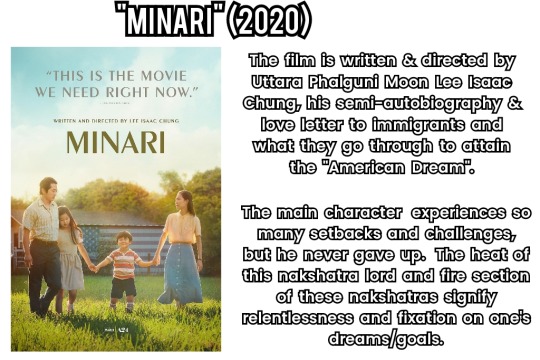
The "American Dream" refers to the belief that anyone, regardless of their socio-economic status and background, can achieve their dreams and make a better life for themselves in a society where upward mobility is accessible to all. The core ideals of this belief are explored in the film The Pursuit of Happyness, starring Uttara Phalguni Sun Will Smith who plays a struggling salesman rising from poverty to attaining professional success as a stockbroker — his character being driven by persistent effort, ambition, and belief in upward mobility.

The theme of the human spirit's resilience in the pursuit of personal dreams is also seen in the film Forrest Gump, starring Uttara Phalguni ASC Tom Hanks who plays a low IQ man who goes through many challenges and still never gave up on his dreams.
Sun nakshatras are more commonly associated with strong themes of ambition, leadership and success.
Aja Naomi King has Uttara Ashada Sun and Uttara Phalguni Moon, making her a dominant fire rashi native. She portrays the character Michaela Pratt in How To Get Away With Murder. She is a young woman who is an ambitious overachiever, possessing an intense fire in her and is relentless in chasing after her goals with focused determination.

The character Paris Geller from Gilmore Girls, portrayed by Uttara Ashada Moon native Liza Weil, is known for her relentless ambition, being an aggressive perfectionist, and possessing a fear of failure which mirrors Michaela Pratt’s personality, often the cause of her clashing with others.
Sun natives are able to sacrifice and delay gratification for their goals. The elephant tusk of Uttara Ashada represents enduring strength, the nakshatra also being in the first section of the Capricorn rashi (Saturn supporting themes of endurance and delays). Uttara Phalguni's symbol is a bed or hammock, which represents the rest after hard work and generosity, completing the journey from Purva Phalguni in this final stage. And Krittika being the blade, or razor, signifies it as a cutting force able to slice through obstacles, fuelled by a desire to execute excellence.
Daniel Plainview in There Will Be Blood exemplifies the darker, more ruthless and capitalistic side of this "American Dream" — operating more Ketuvian as he is portrayed by Ashwini Moon native Daniel Day Lewis, drawing parallels with Ashwini Moon Christian Bale in American Psycho (further emphasizing why the Sun exalts in Ashwini, as Ashwini possesses this pure, ungovernable and all-consuming masculine energy which can become self-building).
The book Oil! follows the son of an independent oilman who initially idolizes his father's rise to power which has a rags-to-riches quality to it. The book highlights the nefarious strategies that oilmen employ through the main character's sympathy towards the underdog people (oilfield workers), a solar theme which will support further points I'll be touching on. But this corruption of the self from accumulating so much intoxicating power is definitely the darker side of Sun nakshatras.
The character Plainview uses oil as a lucrative resource and leverages it to build his empire, also coming from humble beginnings. He embodies this 'self-made', hyper-independent archetype in which hard work highlights one's determination and ability to turn opportunities into wealth. But the writer of the film, and the author of the novel Oil!, shine light on the emptiness and loneliness of this accumulation.
In the story, The Great Gatsby, the character Jay Gatsby initially comes from a poor background, and he meets a high-status woman who he falls in love with. She becomes one of the reasons for his drive, shaping his desire to escape poverty and become successful.
Uttara Phalguni's ability to outwardly evolve to positions of power and have access to things which are symbolic of pleasure and luxury emphasizes the inward radiance and resilience they possess to overcome challenges.
There is a Solar archetype which possesses a type of independence and a resourcefulness that doesn't translate into dominance, but rather into strictly following one's own path of righteousness — remaining strong willed no matter the people one is surrounded by. And there is a level of generosity and duty to this archetype, as Surya, the Hindu Sun god, embodies Dharma (which is related to duty, righteousness and upholding truth).

Will Turner fully embodies this archetype. Even when he's surrounded by pirates, and learns of his familial background of piracy, he stubbornly sticks to what he believes is right. His character has consistently been a strong moral compass in the franchise, upholding righteousness and truth — pointing to the higher leadership and moral integrity important in Uttara Ashada, as this nakshatra is ruled by the Vishwadevas, who are believed to reward those who follow moral principles and righteous paths.
Being burdened with so much duty, Surya (the Sun god) has to endure distant relationships with his close familial bonds. Will Turner mirrors this exactly, his duty as the Captain of the Flying Dutchman (a powerful evolution of his character as he initially started as a humble blacksmith) binds him to a duty higher than his mortal life. Because of this, he could only see his son and wife every once a decade, much like how Surya cannot be close to his sons and spouses.
A lot of sacrifices that they endure include cutting away human attachments, although this archetype is moreso explored from the hyper-independent lens in Claire Nakti's Sun Dominant Men video, as they voluntarily become absent fathers/deadbeats from their inherent selfishness — very much opposing the ideals of many Sun gods, but a correct negative manifestation nonetheless.
All Sun gods support this solar archetype of justice, leadership and source of nourishment. Helio, in Greek mythology, personifies the Sun, bringing light to the world, also regarded as the god of sight. Surya is a source of vitality and justice. Ran, the Egyptian Sun god, serves as a great protector, encompassing intense sun rays which ward off evil.
Characters which embody this protective, superior force are often played by Ketu and Sun nakshatra natives (and as Ketu nakshatras are seen as dominant forces in nature, we see how Sun nakshatras adapt in isolation, and become dominant as well, using tools and resources to remain resilient). Claire Nakti already explored this with Mula's connection to Hercules, while I connect the nakshatra Uttara Ashada to characters such as Robin Hood & Tarzan. Just as the Sun gods symbolize a life-giving energy which keeps stability in the universe, George of the Jungle and Tarzan are characters who both protect the jungle and its inhabitants from poachers and other humans with bad intentions — their presence alone warding off evil. Both characters serve as guardians to ensure harmony in the jungle.
The elephant tusk (of Uttara Ashada) often signifies, in many cultures, the protection of wildlife, especially from those who want to exploit and dominate nature. It also symbolizes a tool for survival, and it is associated with higher stature and power. This theme of one being the source of life and resources is seen in Robin Hood, a character which has Uttara Ashada influence. Robin Hood is known for safeguarding the well-being of his community, ensuring that their nourishment and dignity is preserved as he distributes wealth from the rich to the poor.
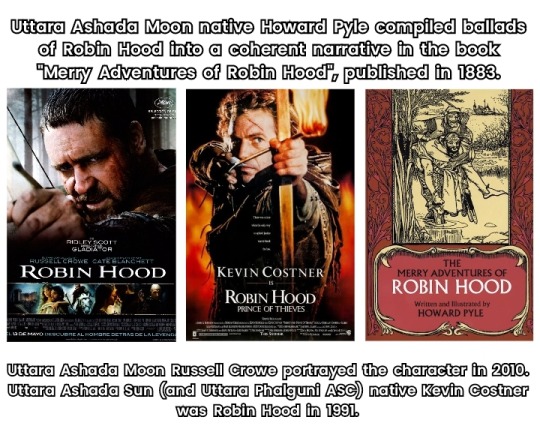
The bridge between Purva Ashada and Uttara Ashada could be represented by the purpose of Sagittarius — the archer aiming straight for victory. Uttara Ashada can be the release of the arrow, the culmination of focus to execute the final victory, as its stars lie close and pointing to the Galactic Center (signifying the bullseye). Uttara Ashada carries the final stage of the archer's triumph, embodying this legacy after the swift release of the arrow.
Much like Tarzan and George, Robin Hood lives in nature. Sun makes one completely self-sufficient, free from societal and religious roots which holds one back from finding their true essence. And the forest or woods represent a place one can explore their true selves and burn away what's false. The dominance of the Sun is seen in these characters' ability to comfortably live in such a place full of hidden threats like wild animals, bandits, or poachers. While for Ketu this theme signifies their huntress and taming power over the wild, for Sun it signifies their radical freedom and adaptability. Living in the forest, Robin Hood represents the figure of the outsider.

In the 2011 film Red Riding Hood, the character Peter is a woodcutter who embodies the archetype of the lone wolf. He is portrayed by Krittika Moon & Uttara Ashada ASC native Shiloh Fernandez. He knows the forest very well, and is often associated with the pure, wild aspects of it. He is very much like George of the Jungle, in that his love interest is also played by a Magha native, which I found this Sun-Ketu association very interesting.

His free nature and rough exterior (representative of his authenticity, making him a misfit in society) is what misleads the viewers into thinking that he is the werewolf that's been killing the townsfolk, but the truly animalistic and consuming force of the story is the character played by Ashwini Moon Billy Burke.
This lone wolf archetype supports their ability in being resourceful within their surroundings, often seen in survival stories in which the Solar native is stranded and is literally isolated from civilization.

Blue Lagoon (1980) is a survival film about two children living on an island after a shipwreck. Krittika Moon Christopher Atkins plays Richard, who becomes deeply attuned to the rhythms of the island, learning how to make use of the natural resources for their survival.
In the film Mad Max: Fury Road, Uttara Phalguni Sun Tom Hardy embodies this lone wolf archetype through the character Max. The story has a hyper-patriarchal system which is built around the hoarding of resources and exploitation of others. Max is completely removed from this society, prioritizing his own survival and maintaining his autonomy above all else.

His detachment makes him representative of someone who can solely rely on their resourcefulness and sharp instincts. This film is great as it stars two Phalguni natives; the character Furiosa being portrayed by likely Purva Phalguni ASC native Charlize Theron. Her warriorship is based around seeking a better future for the feminine, which is marked by love and autonomy.
Furiosa, being Venus and an Ugra nakshatra, represents the fight for liberation and happiness, particularly on the freedom of Immortan Joe’s enslaved women, and her own freedom from such a restrictive society unfit for the feminine. The women's rejection of the patriarchy mirrors Max’s independence outside the system. Initially, he aligns with her merely out of necessity as she and the wives possess resources beneficial for his survival. But he treats them as equals, recognizing their autonomy and agency. Max's collaboration with them emphasizes Uttara Phalguni’s purpose of creating alliances and partnerships for higher purposes, supporting the journey that started from Purva Phalguni nakshatra.
After aiding Furiosa, Max returns to his hyper-independent lifestyle; burning the attachments he formed with the women, and returning to his path that is away from the society.
This ability to survive by oneself, to reshape one's environment, mobilizing resources even in barren circumstances, is a theme for Sun nakshatras — further exaggerating this lone wolf, mysterious archetype (as seen with Max in Mad Max: Fury Road and Peter in Red Riding Hood).
The Sun is the natural giver of light and energy, but it does not receive light in return. Solar natives, often being so self-sufficient, give to others but rarely lean on them for much support. The character Elliot Alderson from Mr. Robot is a hacker, his final achievement towards the end of the series making him a modern day Robin Hood. His mission to expose corruption and empower the oppressed is akin to the Sun being a source of illumination, Krittika especially being known to cut away illusion. He is played by Krittika Sun Rami Malek.

Elliot remains emotionally isolated, as he has noticed that anyone who gets too close to him burns in the end — very similar to how the Sun god, Surya, burns and shines too brightly that his wife, Samjna, runs away from him. Elliot's solitary nature makes him feel extreme loneliness, but he maintains a distance from others, his hyper-independence stemming from his traumatic past and his mistrust of others.
There's a genre of film which explores the cause of such imbalanced independence, much like how Max's reason for burning attachments being due to trauma and previous lose. Christmas Carol movies often have Sun natives casted in them, portraying characters that possess a level of misanthropy and selfishness which drive them into further isolation.
The famous character, Ebenezer Scrooge, is a miserly, bitter, and cold-hearted old man who despises Christmas as it is associated with things of generosity and happiness. His name has literally become synonymous with selfishness, cynicism, greed and a lack of compassion. Ebenezer leads a solitary life, being estranged from family and detached from community due to his cold demeanour and focus on material gain. A Christmas Carol is a tale of Scrooge's redemption through three spirits, who highlight moments of lost joy, compassion, and the choices that led to his current misery and his future lonely funeral.

After his epiphanies, thanks to the spirits who took him on a journey of rediscovery, his redemption is seen when he wakes up on Christmas morning being transformed into a generous, joyful person — helping the community and reconnecting with his family. His renewed sense of compassion from being such a mean, wicked old man could be interpreted as the Sun burning away negativity to rekindle the warmth and generosity that the Scrooge has repossessed within himself. This tale is retold in the 2008 Barbie in a Christmas Carol, in which the character Eden Starling is a glamourous singer who is extremely self-centered and arrogant. She does not believe in Christmas and even refuses her employees from celebrating it.

She is voiced by Uttara Phalguni Sun and Uttara Ashada Moon native Morwenna Banks. Much like the timeless festive tale, three ghosts visit her on Christmas Eve, taking her on a journey through her Past, Present and Future. This leading her to have epiphanies regarding how much of her light had been dimmed and how lonely her future will be. These scrooge characters were once so brilliant and bright, but their inner light became eclipsed by bitterness, lose, or regret, leading to a life devoid of merriness — and being cold and frosty towards others.
Life’s challenges, such as betrayal, lose or disillusionment, leads these solar natives to retreat into isolation and despair. In the film Jingle Jangle, the character Jeronicus is a vibrant inventor, radiating so much brilliance and inspiring those around him.

Though not as cruel as Scrooge was, his arc still mirrors the Christmas Carol tale, in that his light becomes renewed. His young and redeemed older self both embody the festive spirit and joy of Christmas, acting as conduits for the magic, wonder, and generosity for the season.
The transformative journeys of these solar characters also extend to the Grinch, from the 2000 film How the Grinch Stole Christmas, the character portrayed by Uttara Ashada Sun native Jim Carrey. The tale was originally created by Uttara Phalguni Moon native Dr Seuss, first published in 1955.

The Grinch absolutely despises Christmas, much like Scrooge, being deeply consumed by resentment and envy while he isolates himself from the joyous Whoville community. His redemption is seen in him integrating himself into the community with newfound warmth, after experiencing an epiphany through a little girl’s unwavering joy and forgiveness. He returns the gifts he has stolen, realizing that Christmas is about love, not material possessions.
There are solar symbolisms in Christmas traditions, besides the gift-giving and festive feasting. These traditions can be traced back to ancient winter solstice celebrations, which made the symbolic rebirth of the sun, as the daylight hours began to increase after the winter solstice.
In 2018's The Nutcracker and the Four Realms, the character Clara, portrayed by Krittika ASC Mackenzie Foy, experiences a journey which can be symbolic of the winter solstice. The story begins with Clara in a dark emotional space following the death of her mother, this darkness being much like the world descending into the longest night at the winter solstice. But Clara seeks the key to her mother’s gift, which signifies as a source of life, fertility, and illumination that unlocks potential — the gift quite literally being a golden egg. Clara and her companion must retrieve the key and restore harmony to the unstable magical land. This theme of restoration, new hope, and redemption in a lot of these scrooge films, is symbolic to the Sun’s rebirth during the solstice — the return of life.
The practice of illuminating the Christmas tree with lights and ornaments mirrors the Sun's return, symbolizing a brighter future with the coming year. The infectious joy and generous acts during this festive season reflect the gratitude for the life-sustaining force that the Sun is, and the light for new hope it represents, as it promises abundance for the year ahead. The twin deities of Ashwini nakshatra are associated with rejuvenation, new beginnings, and vitality; this resonates with solar qualities, further explaining why Sun feels naturally at home in Ashwini. The Ashwini Kumaras are divine healers who bring restoration and renewal, just as the Sun sustains all living beings with its energy.
The character Robin Hood, much like the Sun, is a symbol of hope for the downtrodden, fighting off the darkness of evil and corruption. He sustains the spirit of his people by redistributing wealth and restoring their faith in justice, consistently being a force of resistance. The Sun serves as a profound symbol of redemption, perfectly embodying the cycle of renewal and the promise of transformation on earth. Its daily rise eliminates darkness, rejuvenating life and reinstituting balance in nature after its lengthy absence. Sun illuminates the paths which signify growth, healing, and change. The very pure symbolism of the Sun makes it an enduring metaphor for hope, forgiveness, and the power to provide. Robin Hood's actions literally restore the imbalance, which was created by corruption and darkness, giving the poor a chance to continue building their lives. Robin Hood stands as a symbol of light against injustice, signifying a timeless reminder that even in the face of darkness, renewal and justice are always within reach. The character Elliot Alderson is also the perfect representation of this, for anyone who has watched Mr. Robot (the only series I'd happily recommend to anyone — it's very dark though).
Merry belated Christmas! 🎄
#krittika#uttara phalguni#uttara ashadha#aries#taurus#leo#virgo#sagittarius#capricorn#sidereal astrology#vedic astrology#astrology#astro observations#astrology observations#vedic observations#nakshatra series#nakshatra observations#vedic astro observations#vedic astro notes#sun#ashwini#ketu#purva phalguni#purva ashada#venus
206 notes
·
View notes
Text
Common character motivations
Revenge - seeking to get even with someone who has wronged them
Love - driven by romantic feelings for another character
Greed - motivated by a desire for material possessions or wealth
Power - seeking to gain control or influence over others
Justice - motivated by a sense of fairness and a desire to see justice served
Redemption - seeking to make up for past mistakes or wrongdoings
Curiosity - driven by a desire to learn or discover something new
Duty - motivated by a sense of responsibility or obligation to others or a cause
Ambition - driven by a desire to achieve a specific goal or succeed in a particular endeavor
Fear - motivated by a desire to avoid danger or harm
Guilt - driven by a sense of remorse for past actions or decisions
Jealousy - motivated by envy or a desire to possess what another character has
Betrayal - motivated by a sense of betrayal or desire for revenge against someone who has betrayed them.
Ambivalence - a character who is conflicted or uncertain about their goals or desires
Freedom - a character who seeks to escape from a restrictive situation or society
Fame - motivated by a desire for public recognition or notoriety
Identity - driven by a need to understand or define who they are
Family - motivated by a sense of loyalty or obligation to their family or loved ones
Discovery - driven by a desire to explore or uncover hidden knowledge
Patriotism - motivated by a love for their country or a desire to protect it
Rebellion - driven by a desire to challenge authority or the status quo
Artistic expression - motivated by a need to create or express oneself through art, music, or other creative endeavors
Religion or spirituality - driven by a desire to connect with a higher power or to live according to certain beliefs or values
Altruism - motivated by a desire to help others or make the world a better place
Atonement - driven by a need to make amends or seek forgiveness for past actions
Nostalgia - motivated by a desire to return to a simpler time or relive past experiences
Status - driven by a desire for social or professional standing or recognition.
Insecurity - driven by a need to prove their worth or gain acceptance from others
Legacy - motivated by a desire to leave a lasting impact or to be remembered in a certain way after they're gone
Survival - driven by the need to survive in extreme circumstances, such as a natural disaster, war, or an apocalyptic event
Belonging - motivated by a desire to fit in with a certain group or community
Love of knowledge - driven by a passion for learning and acquiring new information
Addiction - motivated by a compulsion to engage in a particular behavior or activity, such as drug use or gambling
Inciting incident - motivation driven by a specific event that triggers or sets the character on their journey
Fear of death - driven by a fear of their own mortality or the mortality of others
Intimidation - motivated by a fear of others or a desire to intimidate others for personal gain
Envy - driven by a desire to possess what others have or to be like someone else
Manipulation - motivated by a desire to control or manipulate others for their own benefit
Protecting others - driven by a desire to protect loved ones or innocent people from harm
Sense of duty - motivated by a sense of responsibility to fulfill a particular role or obligation.
If you want to read more posts about writing, please click here and give me a follow!
#creative writing#writing#writeblr#writerscommunity#writer things#writers#writersociety#on writing#writblr#writers on tumblr#write#writers and poets#writers block#female writers#writing community#ao3 writer#writing advice#writing adventures#writing things#writing tips#advice#my characters#original character#character design#own character#motivation#resources
2K notes
·
View notes
Text
Okay I'm finally doing the rant!
Even if somebody deserves to die (which is not our judgement to make) or needs to die for the safety of others (which is also a difficult judgement to make and must be a last resort) their death is still a tragedy and should never be praised or cheered.
You can believe that somebody's death was a neccessary evil while still understanding that it was evil nontheless. I don't think it's acceptable how many people right now are cheering for others to die. The death of an evil person is just one more person who will never be able to better themself.
I'm just begging people to research things like the French Revolution where the need for justice was turned into a desire for violence and nothing more. I'm asking you to wonder where it ends. Every CEO can be replaced by one with better security. Every politician can be replaced by one with more extreme policies to keep you in line. Your neighbor who works at an insurance company can be replaced by the boss, but her kids will never see their mom again.
Isn't that serious? Isn't that a big deal? Or will your 'great revolution' be carried out without fail, only hurting those with power that truly deserve it? Once all the big bads are gone, who'll replace them? Just another one of their buddies. Unless you take complete control so you and YOUR buddies get to make the unethical decisions! I mean, you've already killed several people to get here, might as well keep killing anyone who threatens your power! Oh- but you'd never do that. You're one of the good people! You've proven your goodness by salivating over the idea of waving a politician's head on a stick! Good people never look for peaceful solutions!
Empathy is just... gone it seems. People who disapprove of violence or question the helpfullness of this 'street justice' aren't thoughtfully debated, they're called 'bootlickers' and 'facists' and told to kill themselves.
You can believe that a system is corrupt and needs reworking without murder being your first choice! Murder should be the last choice! Maybe if you care about a system being changed you should research the system and attack it in ways that won't get people killed.
Stop cheering for murder!
(Oh, and don't bother ranting at me in the comments. I wrote the rant for you to save you the time:)
"Well as an [insert oppressed group here] what you're saying is actually really harmful due to the damage that these bad people cause the world. You don't understand the painful lives people live that make killing other human beings morally justifiable. I'm going to argue that killing people is okay, even though your original argument is towards the mindset of cheering evil acts like murder and thinking of oneself as a hero who can never make evil decisions rather than towards the neccessity of said evil actions. Some people laugh about murder to cope, you abelist! And you're also a hypocrite because you're totally okay with gay disabled people being murdered despite never saying anything that would imply being okay with that! I will continue to project my own beliefs onto you, turning you into a villain until I am pleased with the thought of your violent death! There is nothing wrong with me and I don't need to work through these issues rather than spread them online! I don't know you, but I hate you! Kill yourself, you facist!"
Seriously I could not care less what you comment. If your argument is that murder is good and people should be killed without trial and that I am somehow a bad person for questioning the morals of your belief, then... your opinion kind of means nothing to me..
181 notes
·
View notes
Text
Saturn's Exaltation and Debilitation

Saturn works well in Libra, Capricorn and Aquarius because in these signs it fights for injustice in ways that are objectively right.
Saturn debilitates in Aries and doesn’t perform well in Mars signs, because Mars is a sign of subjectively fighting for personal conviction and defending one’s boundaries from others. Ironically enough, even Mars exalts in Capricorn, so even personal conviction when it comes to self protection should be tempered with objectivity.
The person with Saturn in Mars signs is gonna fight for injustice based on lack of proportion coming from biased personal motivations and may be completely off the mark and lack bigger perspective in understanding their own troubles. They are unnecessarily defensive and stressful to their environment. They may not understand what is generally right, they operate based on what they personally believe is right and they think their personal feelings represent the bigger truth of the universe, while in fact it’s their very biased conviction.
People with Saturn in productive signs have a better place fighting for necessary changes because they have a good, well measured cause and so their efforts will always benefit the humanity collective, because everyone on the planet benefits from even one person doing the objectively right thing, even if it’s linked to someone’s personal life. Meanwhile, if weak Saturn does the right thing just for oneself, one is not very useful to the world in general and thus their long term contributions are weaker and they will even hurt people unfairly stumbling on the way.
In truth, people with Saturn tainted by Mars have an internalized sense of shame regarding the defense of their personal conviction and their right to it, which, just like with Sun afflicting Saturn, can come from an authority figure in their youth. So they yell at everyone around them louder than necessary, even if no one around them actually cares to attack them, simply because they feel attacked internally due to past traumas and they completely lack the objective perspective to be able to see that.
Saturn is friends with Venus and exalts in Venus’ sign, because a working Saturn is a good psychologist, able to accurately discern other people’s motivations. As a result, a good Saturn takes things less personally because it realizes that people actually don’t care that much about other people, as everyone is preoccupied with their own survival. A strong Saturn simply puts up an impenetrable wall based on what they know to be objectively right, a boundary people can’t cross and acts accordingly if someone tries to breach that wall, but is unbothered otherwise.
Saturn tainted by Mars is instead convinced everyone is out to get them, because they internally believe that everyone wants to attack them for their personal beliefs. As a result they lash out easily and antagonize people when triggered, because they’re unable to keep their cool. They also lack social grace, because they can’t solve conflict productively and they add extra tension to any problematic situation due to their temper. That makes them unpleasant to be around, because in an already tense situation tension should be diffused so that people feel less burdened emotionally and can look for easiest, most productive solutions. Anger in a Mars-Saturn person obscures their clarity and makes their environment more inflamed, like pouring gasoline on an already existing fire instead of putting it out.
The only path for a person with Saturn afflicted by Mars is to become aware of their complexes and defensiveness. They need to internally validate their personal beliefs and learn to put up a wall when it comes to them, not to try to convince anyone but simply to give themselves the right to live the life they want to live. They should become aware of these beliefs and simply live by them independently regardless of anyone’s opinion. They need to realize it’s objectively correct for them to be able to have these beliefs, because after all their life is theirs and not anybody else’s, so they should live it the way they want to.
As a result, their general productivity to the world will always be decreased because this person’s individual karma is about getting into balance with themselves so that they don’t end up constantly upsetting their environment. There are no valid objective external causes they can contribute to, because their karma in this life is about healing deeply individualistic wounds of personal bias. At best, they can be good at motivating people to stand up for themselves, but they will only give that advice coming from a very personal place that relates to their own experience. Of course, one can argue that their own personality and experience is a result of a long lasting line of their own ancestry as well so their very existence is fixing some latent karmas, but the physical productivity imprint will still be decreased as their emotional complexities take such a toll.
The karma of a strong Saturn instead has the power to right wrongs down to their ancestral line and manifest to have physical, societal impact during their own time on Earth, because they have the power to correct long lasting wrongs in the environment around them, which often originate from a long time before the Saturn native even arrived into this world.
140 notes
·
View notes
Text
Mizu, Akemi and Gender as a weapon
Mizu's masculinity isn't something she dislikes or is seeking to be rid of. Even at her most feminine, Mizu is still androgynous. Not limited by gender performances, stereotypes and beliefs. It's all part of her. The doting lover, the skilled samurai, the knifemaker, the patron of arts. It just creates internal conflict when she's unable to connect to her femininity in a gendered society, knowing that her femininity will be seen as weakness. On the flipside, we know Mizu suppressed masculine parts of herself in her marriage with the expectation that they'll become a deal-breaker which also wasn't healthy. Mizu doesn't need the go-ahead to be traditionally feminine, she just needs space or a person/people who will allow her be herself without nitpicking parts of her. In that vein, I also wanna address how Akemi is also masculine in her own ways.
Just because she doesn't wield a sword or has an androgynous bodytype, doesn't mean that Akemi isn't masculine (the social understanding of it). She is very much so in her own right. Seki, her tutor, keeps aligning her with her father claiming that they have the same conviction in their beliefs in which their roots are unshakeable. This lays out how traits of power seeking, ambition, stark independence and intelligence that her father prides himself on are discouraged in Akemi as she's a woman. She is politically informed, highly educated and sexually dominant. She is calculative, express in her expertise at Go, something she's been better than grown men at since she was 12. Seki tells her that beyond just surviving in her marital home, she is equipped to succeed, expand her territory, find people's vulnerabilities, capture and win. That she can learn to do anything she wants and be whoever she wants, even if the goal is to become the ruler of Japan. In that same episode, Mizu is parallel to Akemi where she seeks wisdom from Master Eiji to exact an artful revenge where he proceeds to tell her that he didn't train her to be a demon or a human but he showed her how to be an artist. That revenge, swords, pots, noodles are all the same to an artist. The goal is to learn to be good at something. Anything. Mizu's pursuit of revenge is as masculine as Akemi's pursuit of power. They are both capable of learning. Of being successful. They are both elements of their own destiny. Water. Fire.
It doesn't matter what the means used are if the objective is one and the same. Akemi learnt this throughout season 1. That to evolve oneself guarantees success over only changing the scenario by running. Like Mizu, Akemi works with what she has. She is feminine presenting, enhanced through the princess finery, she can't fight but she uses her beauty, charm and wit to execute her plans and bend men to her will. Mizu attempted to maneuvere this same tactic after Mikio called her a monster, dolling up like on her wedding day to appease to his masculinity but it only pushed her towards the one thing she does best- wielding a sword to survive. Mizu knows how to fight, that is her agency, not a definitive of her gender. To fight and evolve is human, not select for a particular gender. Akemi also knows how to fight. She's trained in koto playing, singing, dancing, literature, poetry and the sutras. Her modus operandi is to weaken a man through his own hubris of thinking that she presents no threat. Which, as a personal opinion, I find a requires a tad more skill than cutting through flesh and bone. With Mizu, men brace for a fight, with Akemi, they don't even realise there was one in the first place. I posit that fighting is seen as more glorious than manipulation because it's a traditionally masculine way of dealing with things. Meanwhile, artful manipulation if rife with character bashing because femininity, according to some, should not not exist to take advantage only be taken advantage of, which again. Trash take. Needless to say, both Mizu and Akemi easily outclass the men who stand in their way.
Finit

#blue eye samurai analysis#mizu#akemi#netflix blue eye samurai#blue eye samurai#mizu blue eye samurai#akemi blue eye samurai#blue eye samurai mizu#bes akemi#netflix bes#bes mizu#bes#bes netflix#blue eye samurai netflix#akemi ito
191 notes
·
View notes
Text
apologies this is far from a coherent shower thought but i think it's time we like. decided to detach our identity a bit from the things we do. it's fine to just read. you don't have to be a reader. it's fine to just game. you don't have to be a gamer. you can be those things but i feel like in a quest to find ourselves and open our hearts, especially to others online (because i know, the first thing we do when on a new platform is say hi im [name] i like these things we should talk, i know, i do, my pinned post is literally that), i feel like we forget that we are more than the things we do and even the things we love. we, to borrow words from slay the princess, contain it in our multitudes.
it's a sentiment i've felt for a long time as someone who has been on the internet and in fandom spaces for a good decade now, and like. i find when we hold these things so close that they become us, we become too defensive over them. how many minor fandom disagreements spiral into threats, name calling, doxxing even? i find, especially younger users in fan spaces, tend to take even small differences of opinion and take them personally. saw someone blow up and call people awful names over believing only one person could top in a genshin ship. another left a server i was in because they disliked a popular character, and other (respectfully), decided to share why they did like her. i get that things like rejection sensitivity are a thing, but i think this failure to recognize the self as an entity apart from the things you do and the thoughts you have definitely contribute to this. phenomenon i suppose.
it's genuinely slay the princess that has given me the vocabulary to express and understand this thing i was already thinking. i think, though we are not gods, it's important to understand that we are not things so easily defined. we consist of our thoughts, our actions, our perceptions, our beliefs, and more. even the outside world's perception of us reflects some part of our nature. but not all of it. it's impossible to define oneself in one, two, three words or even an essay.
because like we don't exist in a vacuum. part of our existence is defined in our interactions with others. but not all. never all. there is no one who can truly know you, and we cannot truly know ourselves. our principles bend to the whims of circumstance no matter what we tell ourselves otherwise, so we can't decide what we are or what we would be in a situation for sure, ever. and that's not a bad thing, but if we can't ever truly know ourselves, then how can we assign such great importance to something as superficial as the things we enjoy sometimes?
we are both a constant and the capacity to change. and to take just a handful of things and call it your identity, even subconsciously, is a disservice to the self. in an effort to be seen we break ourselves down into easy (i hate to say it but) marketable pieces.
take being a reader for example. it has always felt like vague slang for booksmart, thoughtful, likely quiet and introverted as well, just as much as it means "i like to read books". theres an aesthetic to it involved, and a whole subculture. do you write in your books? do you keep them museum-fresh quality? do you read smut or classics or high fantasy or satire and what does it say about you? if you say audiobooks aren't real literature, are you signalling to others about quality and sophistication, or are you a pretentious asshole, and ableist to boot? these connotations assigned to such an otherwise benign thing about someone are i think are reflective of the construct of identity and perception. i could go on about it in a way that's more coherent but i, a student, have other things to do right now.
(does being a student make me intelligent? does it impress you to know i study medicine? what if i told you i average Cs in my classes? what if i told you i dislike patient care? what if i told you i'm not here for the money OR to make the world a better place, and that i'm here purely to serve my curiosities about the way the body functions and to absolve my obsessive need to understand just what are we? does this change what you think of me? does it matter? what if you knew the guilt i felt for seeing so much suffering, but still hating patient care enough to worry endlessly about being stuck in it as a career? am i better for it? but i have not acted on this guilt. it is a mere feeling that only i know. knew. is it different now that i've confessed it? does it matter? does any of it change who i am, fundamentally? or am i a thing detached from it all? or. as i like to believe. is it both? your shifting perceptions of me and the way i change shape and form (so much like our beloved princess in slay the princess) in your eyes, they make up me just as much as the soul or the self or whatever other philosophical name you assign to it. at the end of the day, isn't the most important thing that i am just me? both devoid of and constituted of the sum of my parts? what is found in the spaces between my cells? impulses and chemicals. is that me? is it all me? can i ever really know it? and why, why, why define it at all?)
#if you read all of that im sorry i just#needed to express this in some way#and a simple journal entry wasn't doing it#i hate journalling so fucking bad#is there meaning to any of it at all? or is it just irrational and i am wasting my time?#and at the end of the day#who gives a fuck#rain rambles#sorry i think the existential horror of consuming both#slay the princess#and#the stranger#has like compiled itself into an unholy amalgamation in my thoughts#and i think that like#the stranger route#which is achieved by refusing to engage with the princess at all#i think that is fundamental to what i feel about this#when she isn't perceived at all she morphs into an impression of the shifting mound#all her multitudes spiralling together until what you end up perceiving is just#unholy#everything and nothing and terrifying to behold#but even the stranger is a shadow of the whole self because you exist in the context of others#god i love that fucking game
44 notes
·
View notes
Text
Thinking about how the main points of conflict within Ink's character is how he's characterized as someone with communication issues and who has a high resistence to changes.
(i use he/they for Ink in this, since no one calls them 'they' for some reason.)
Firt of all, they're a meta character. He's aware of the outside world and lets that very clear with his general whole world mentality (a.k.a they sees people as characters within a story), so them having a hard time communicating with others is by no means surprising because, again, he's a meta-aware character that has the knowledge that everything surrounding him is automatically fictional. But one thing interesting to him and worth noticing, is that he actually shows signs of being antisocial and having an obvious disregard of people in general sense (or just, having low-empathy/remorse) to the point of being completly disconnect from society and not even seeing himself as a person/monster individual. (Making it clear that this does not make Ink a bad person by any means). You know, they even pushes people away due to his careless nature because he's aware that it hurts people, and he doesn't want it to anyone.
Also something to keep in mind, he hardly has a proper social understanding!! (Something mentioned in the FAQ). They have a hard time understanding social interaction in a typical way and that alone heavily affects his way of communication (a.k.a they're extremly blunt and straight forward). Interesting enough, this information alone heavily implied or otherwise just confirms, that Ink have deficts with Theory of Mind (which is -the ability to explain, predict, and interpret behavior by attributing mental states such as desires, beliefs, intentions and emotions to oneself and to other people-). Since social understanding and theory of mind derive from the same socio-cognitive concept but with different terms attached to it.
In second analysis, he does not react/deal well with sudden/forced changes AT ALL. It's actually a main point of conflict with Ink's character and other people -whetever or not is he able to adapt to changes in the script-. It's worth bringing up that this specific mentality of his has also to do with this previously mentioned meta-awareness and persintence on the respect of the creator's previous intentions with AU's. But he genuinely also has a extreme hard time letting changes happen and by other words, also let him be affected by them.
Anyways, this is just a long explanation to why reading Ink was a character with ASPD (sociopathy) and ASD (autism) genuinely makes me have a better understanding of him lmao.
142 notes
·
View notes
Note
Hi! I remember you talking about doing shadow work (in a reply to an ask, I think); do you have any advice on how to start? Especially for someone who who has a really hard time with consistency/habits? Thanks!
For me it is not an intentional practice separate from my regular life, it is an orientation toward my own most negative thoughts/impulses/reactions. I do not believe that any thought is harmful or morally wrong to have, and so when I experience a thought that is violent, cruel, bitter, pathetic, prejudicial, short-tempered, jealous, whatever else, I accept it, and study it with curiosity rather than self-condemnation.
I notice patterns over time in what I am particularly un-evolved and unenlightened about. What hang ups do I have? What weird bullshit respectability politics or traditional gender norms do I still apply to myself or to others? Who do I fuckin hate and why?
Which of these things can I just kind of shrug at and accept as a feature of my programming and which ones do I see seriously holding back my life? That's probably the hardest part of shadow work for me. I'm very aware of a lot of my flaws and the things i'm irrationally emotionally reactive to and defensive about, but I get attached to my way of seeing things. It can be scary to become more open-minded and uncertain and less spiky. And some things just aren't easy to change even if I want them to. Part of shadow work means allowing oneself to be in an unfinished state.
Another part of it for me is accepting with a dark kind of gratitude that the world would be a pretty terrible place if everyone was like me. There is so much about humanity that I do not understand. I could never be a surgeon. I could never be a good parent. I could never be a social worker. There is so much I am so bad at. Maybe this is the Narcissism and Lack of Empathy talking, but I've had to really humble myself. I used to think I was so much more rational and less of a waster of time and resources than most people around me. Now I realize I have run on self-denial and repressed emotionality for a very long time and demanded that life have some Purpose when it doesn't. So a lot of my shadow work has been acknowledging my ultimate smallness and feebleness and just general uselessness -- i have a lot to be grateful to other people for doing, but also life has no purpose that needs to be fulfilled so i can just exist and suck for every single second that i'm alive if that's what i'm gonna do.
radical acceptance shit is definitely mixed in there, and some DBT kinda strategies. I've finally arrived at a place where I can love my dissatisfaction as a core part of me and accept that life is not meant to be happy and comfortable. we always keep moving, changing our environments to make them a little better, chasing after new passions and then getting disillusioned with them, falling in and out of love, getting lost. we're always lost. we're always making mistakes and being dumb as humans. that's like what we are. silly little freaks that make up lots of pretend games for fun but then get swept up in believing them too much. i kind of feel at peace now with the fact that i'll always be messy and impulsive and have weird beliefs and will change constantly and look back on my past with a cringe reaction every four or five years. i dont expect myself to ever arrive, because what the hell would that look like?? being satisfied and happy sure sounds a lot like being dead.
93 notes
·
View notes
Text

How to Guide on Shadow work,
A loose Step by step and simple guide to shadow work.
Before you continue
I know we all saw those tiktok shadow work books and how easy it was! Now, so many people are trying to get into shadow work, but they just don't know how or what it actually is! So I'm here to try my best and explain what it is, the benefits, and the purpose of it! If anything I said is wrong, please let me know! Remember! Everything I say is just what I know works for ME. If it doesn't work for you, create a way that does work for you! Find more resources that can help you!
What exactly is Shadow work?
First, we have to understand what a Shadow is. Carl Jung is a psychiatrist and psychoanalyst who created the Jungian Archetypes. The term Shadow and what we're focusing on comes from Jung's model of psyche. The Shadow is the unconscious part of your mind that has all of the repressed aspects of oneself.
But what does this mean exactly?
It means that the Shadow embodies the unpleasant side of yourself. From unfilled desires, unhealed damage/trauma, and things you consider to be harmful. Also, it can be referred to as self-projecting.
People naturally repress their Shadow because it's things that are socially unacceptable, harmful, or hurts you in some way or form be mentally or physically.
Shadow Work
Now, Shadow Work is actually a type of psychotherapy in psychology. It involves exploring, acknowledging, and integrating the parts of yourself that you've previously repressed or even ignored.
The goal of Shadow Work is to recognize and acknowledge those parts of yourself. It's to learn that the parts you repress is who you are and those parts of yourself aren't good or bad. It's to learn how to accept yourself and who you are at your core.
How Shadow Work helps
Identifying and regulating your emotions (why do I feel this way? Am I angry at you or at myself?)
Improving your self esteem, self acceptance, self confidence, and self projecting
Strengthening and deepening relationships
Learning healthy coping mechanisms that work for YOU
Learning and how to modify self-sabotaging behaviors
Be cautious
It is easy to go down into a self deprecating spiral when doing this! Remember that the goal is to NOT highlight your worst qualities and get rid of them but to accept those qualities and learn how to live WITH those qualities. You are exploring yourself. This means self acceptance. By rejecting parts of yourself you are going down the opposite path!
How to approach shadow work?
Think of all of your 'cringiest/embarrassing' moments and stop thinking about how other people view it or what other people think or how you THINK they thought about it. Think about WHY you felt embarrassed in that moment. Be on your own side. Don't be an enemy to yourself or bully.
If something about a person triggers you (shocked, taken aback at their behavior), think how you would react to yourself exhibiting that behavior? Are you jealous or resentful of someone? Feel that feeling and really get to know it. Know exactly what you are feeling and know the exact cause.
Understand WHY you have negative behaviors. Did something happen in the past that made you develop that behavior? Once you acknowledge and recognize the cause of that behavior, you can then work towards a path of 'healing' in a way that you can accept it and find the next step towards a better sense of self that YOU can accept.
Recognize that the past does not exist. What exists is the present. If you felt embarrassed, something in your 'past' has conditioned you to feel that way. Your mind is still holding on to what has conditioned you. You have to learn to let go because the past is no longer happening right now. It doesn't exist, so there's no need to still feel conditioned to react embarrassed when it's already passed.
Everything you do as a habit, belief, or values that you don't fully understand will form and is your shadow.
Beware that you have things about yourself that you don't fully understand. Take time, reflect, recollect, and understand the things you don't get about yourself. There is never a 'I just picked this habit up.' Why did you pick that habit up? What made you pick it up? Is this a response to something that has happened to you before?
Why do you react a certain way? What caused it? When did you start doing it? What emotions do you feel during it? Why do you feel those emotions?
How do you motivate yourself? Why do you motivate yourself that way? What caused you to do it that way? Is it harmful or helpful? Why?
Integrate your Shadow to yourself. Find ways to express these unconscious things you repress in a healthy way.
Results of Shadow Work
It is important that as you see results that you MUST be kind to yourself. You must be patient and not rush through it. Setbacks are normal. Go at your own pace and take breaks. Everyone has a shadow. Do not feel upset over the things you learn about yourself. Seek help from others. It's okay to find a support system during this process. Whether it be from a professional or someone close to you.
Tips
Journaling your progress.
Be persistent
Be patient
Understand that not everyone goes on the same Shadow working process. Learn what does and doesn't work for you.
#shadow work#shadow#personality#spiritual journey#witchblr#witch#paganblr#pagan witch#pagan#paganism#learning#healing journey
48 notes
·
View notes
Text
"Out of Spite" The Nine Sols AU TEDtalk time. The Path of Trials, part 2
Quick reminder what this is post about: All of the Sols saved by Yi need to go trough a trial, tied to their biggest flaw or fear. Two key figures to help them on a spiritual journey is Yi himself and ShuanShuan!
Sols will redeem themselfs, but only some aspect of them change a little. This path of redemption exist not to abolish their sins to apeman or fellow solarians, no.
This is their way to clear karma to oneself, before they join the great tao... or will they?
3. Jiequan - " Trial of Agony"
Listen, guys like Jiequan...well...they can be redeemed. This is their kind of shtick. He is a sadomasachist and this needs more then help from his friends (he also doesn't have any and would NOT listen to any advise!). However, what I like to do with this type of character is giving them a chance to socialize. This is my genuine belief that giving a murderous character a friend circle they can socialize with is a way to show them that they ARE able to act differently. And they will be rewarded for it.
Yet still, Jiequan for me is not that level of bad (not Overlord mtmte level of bad). I think at this point he might learn how to interact with people normally still... i don't think he would change much. Remove his obsessive behaviour - and this is not Jiequan anymore.
------------------------------------------------------------------------------
Jiequan life is always about to proving a point to someone, troughtout all means nessesery. To prove that he can revive the Jie Kingdom. To prove that he is strong. To prove that you deserve your place at the palace, as the Jie heir.
In his childhood the only way to prove that you worth something is violence. Violence is the only way he resolved all of the problems. Not matter was he enduring it or doing it. It was a way to show that you are strong. That you are the leader. To make people respect you. To listen to you. To bring their attention to you.
Jiequan was a lonely kid. The weak kid. Now? He's no more.
He learnd to love violence. When he was a kid, he tried to prove that he would be а better ruler, he would guide Jie Kingdom to the former glory not only through war campains, but through other means. He endured one beating under the other, always managing to stand back. He survived the pain.
Then he embraced it.
He learnd that many of his peers don't understand the way of words. Only the way of pain. You change or you die, so is the life's rule.
And he changed. He changed all right!
He suffered only to become stronger. Every faliure, every drop of his blood and sweat is a way to become a stronger man. He suffered only to bring pain to his enemies. And enemies of his was the enemies of the Jie.
The pain teached him that he should never give up. The pain is effective way to communicate to everyone because all of the living beings understand it. Well, not like him. They don't learn from the pain, they don't understand that life is an embodiment of the agony itself. And heroes are forged in agony.
Vital interaction with Yi: Yi... Yi understands Jiequan. He feel no guilt over using apeman as a power resource. Yi is rejecting the comfort, working himself hard. He is willing to do anything that matters, if it will secure survival of their race. Jiequan liked that in men.
Yi was a living example of his philoshophy. Everyone turned blind eye to his cold cruelty, they liked the guy anyway. Not that much, yeah, but he had his trusted circle of friends and admirers. Eigong, his mentor, was proud of him. He had a loving family. Colleagues are listening to his advice.
Yet Yi was looking a him with disdain. One night they had a chance to talk about the affect of suffering on brains. It's the fisrt time Yi ever talked to him properly, listend to him. It was a good debate, almost civil, when Yi acknowledged that Jiequan has a point. Started non-stop talking about brain research and whatnot. The more Jiequan listen the more he taught that he was right all along. That severe pain makes people think clearer, show who they really are underneath this facade of a person. He wondered: How Yi looked under his coat of cold blood?
It was point of no return, because this is where his obsession with Yi started to grow big. Jiequan wanted to disect him, simultaneously make the man worse and better at the same time. Bring him pain, make him to finally understand how it would change Yi. Make Yi acknoweledge him. Understand his pain.
And when the opportunity came, after 500 years of trying to piss of Yi for good, he did exactly that. He showed Yi the way of the pain. He saw his eyes burning with hate and agony. This was THE moment of his life. Point of no return.
Yet, the result of the torture was...strange. He expected Yi to fight like a beast (and he did so!), but not to...show mercy. Yi said that he's not like Jiequan and tried to prove it. Still, they both know what he did to poor Goumang.
Yi is a cruel, selfish man. They are alike. Jiequan never stopped to prove this to Yi even after his rescue. Even after he brought little birdie to the pavilion. He even brought the Feng girl, whos only good use was being a money bag for his endless endeavours. Heck, he didn't thought that asking to say hi to old guoshi would grant him an opportunity to do that himself.
And Yi? He tried his best to prove Jiequan wrong. Being patient with him, not breaking his legs when he convinced Abacus that he can be of use. Jiequan even worked with fucking Kuafu (who was strangely happy that "such a cool guy" needs his services, ugh) to make for Yi new rhizomatic weapons. Yi thought Jiequan training with him was a ploy. Made Yi to drop his guard to stab him in a back, because by surviving the fight Jiequan "lost his honour" or some shit.
What Yi didn't like that he enjoyed beathing Jiequan to a pulp. Their trainings were bloody, messy and kind of extatic. After their spars Yi felt himself calmer, strangely calmer. Like they both quench their thirst for blood for a present moment, only to surprise each other next time.
Yi didn't catch the exact time he would offer to help to tend Jiequans wounds. The man always was going to the highest point of pavilion to lick his wounds. Saying that this' but a scratch. Still, asking was worth it. Jiequan looked at him like a scared deer on the road. He refused Yi's attemps to help, quitely bleeding in his corner. Looking like a man on the bring of the death, but strangly happy.
He didn't notice when they became closer, enjoying more quiter moments. When Jiequan tried to sooth his pain, bandage his wounds, saying that it must be hurt everytime to return from the dead, maybe he should kiss it better to...
Wait, what the-
Vital interaction with ShuanShuan: I think at first Jiequan saw ShuanShuan as a tool. A mean to get closer to Yi, his get free from jail card. He really did convince Ruyi that he can teach kid how to defend himself.
ShuanShuan was...reluctant. Their training often ended in agrument that apeman child can make people wish to not fight with him. It turned worse when Yi slipped up and said that thanks to Jiequan Yi stopped to beat bad guy's up and brought more friends (that kid obviously adored). It made Jiequan pissed but he can do nothing about it, because if something happened with little brat Yi would bring down all of the New Kunlun with him. Besides there was a little problem. When kid get hurt he started to cry and Jiequan just...starred at him. He was confused. Jiequan long forgot how is it to cry when you feel the pain. Pain of failing, pain of loosing someone, pain of rejection. It's like... it didn't hurt anymore. Or so he convinced himself.
Because everytime Jiequan fights with Yi ends, ShuanShuan is gently tugging his pants and asks: Does this hurt? Jiequan smiles and says that it's not, he'll manage. Kid was in fact the first who offered him compassion, despite Jiequan hurting Yi. Who seen him nervously waithing for root node to spat ot Yi's bruised body. Share their quiet moments, talking (more like barking at each other, but bickering and being annoying is his way to show affection) or reading toghether. Of how Jiequan follows Yi like a shadow, trying to pry emotions out of him.
One day he lets kid stay. Sleep beside him, while Jiequan trying to stop blood gushing out of his guts.
He might understand why Yi is so protective over the kid. He might understand that maybe, just maybe, it hurts when he sees Ji playin with ShuanShuan more often, then with him in his childhood. It hurts when Yi let someone touch him gently, but not him. It pains him to be alone. It pains there is no one to ease the agony. Both his and Yi's.
They are the same. Isolating themselfs from the others to lick their wounds alone. Jiequan hoped that enduring the pain will make him a better person when, in fact, well, it just isolated him. Sometimes pain is just a pain, it just leaves a scar that never stop hurting. It hurts like hell to be alone.
He wants to be comforted and understood. He wants someone - no, Yi - to tend his wounds. He yearns for Yi to touch him out of the battle, to acknowledge his suffering and say that Yi...that Yi... that Yi loves him. The way he is.
So, he will suffer for Yi. Leaving bloody trail of Dusk Guards behind him, so Yi's path become little easier. So the only person to draw Yi's blood would be Jiequan himself. Enemies won't tend Yi's wounds but he will. He will be the only pain Yi needs to expirience in his life EVER. It's his way of protecting Yi. Besides... Yi is the only one who will make Jiequan's pain feel a little bearable.
4. Ji - " Trial of Apathy"
Before we start talkin about Ji let's get one thing clear: I support the headcanon that Ji was somewhat of the parental figure to Jiequan. This will play a role in this au, so, please keep this information in your head. And also, I belive that at somepoint Ji left Jiequan, probably when he was 15 or 18 y.o. to live in Grotto. ____________________________________________________
Ji lived a long life. Maybe, someone less apathetic to the twists and turns of solarian history would say he had a very exciting life. He's a living piece of history, witnessing the rise and end of the empire of Jie, being on both sides of the war in Turbulent Era. He saw the rise of taosism. He saw the new era of technological advansments on the bring of their civilization last breath. He saw death. He saw life. How people he loved come and go, leaving their mark in history of Penglai, but all of them end up joining tao when the day comes. He mourned, at first. He cried, he felt his heart skip a beat everytime hexagramm shown a grimm future of his loved ones.
Then, he stopped to care. He is not just a seer, but a scribe. Scribes are humble observers of the world. Collecting and preserving history, though, Ji always found it humorous. Doesn't scribes tell story through their own perspective? Well, that was a reason he never became a scribe himself.
Why should he? He is just a "lucky guy". He never wished to live that long or forsee future. He never wanted to build an empire or have his own guild. So, he became a silent observer of life, but, he never found a reason to stay and enjoy it. Not anymore. What people call time is just passing by, like a river that flushed every year no matter was there Ji to witness it or not.
He grew tired of life. It was always twisting and turning, but he lost interest in it long ago. The people he loved are no more here, only remnants of them exist in the books of history. And even this remnants are twisting and turning trough the time and lense of the ones who tells the stories of the past.
Truth is: he's a coward. He could end it a long time ago but he was too apathetic to save someone, what about himself. So, he just waited in Grotto. Writing about memories of the past. Preserving what's left of the Lear's and Jietong's legacies.
Vital interaction with Yi: When the Yi arrives to the Grotto, Ji offers him an insight into the future. Ji sees their battle but not the ending of it. It's unclear. What he see is his own shocked face.
And so, when the time comes Yi refuses to finish his job. He says that someone is waiting for him at the pavilion of Four Seasons. Yi says...that Jiequan waiting for him. Alive and well.
And so, the hexagramm was right. His face, after all those years show his shock, because when he checks the fate of his student, the kid he help to raise, he's death...changed. No longer by the hand of Yi but... well. That is interesting.
Ji smiles. He remembers a sertain someone also was able fool his hexagramms. Yi is reminded him of an old friend so...he might stay. Just for a little longer.
Vital ineraction with ShuanShuan: At the pavilion Ji doing the same as in Grotto. Studying others. Observing how they ineract with each other. Living they daily and monotone lives. It's peaceful, like a meditation. Sometimes he even feel nostalgic when Yi and Jiequan yelling and pining at each other. But he is unaware that someone observing... HIM! Kids are curious by nature and so is ShuanShuan. They just silently observe each other from afar, until the day Yi and Ji having yet another late night philosophical debate. ShuanShuan joining them, saying that they both are the two sides of the same coin. They both can't enjoy what life gives them, cherish it and accept that all people must go one day. That it will always hurt to loose. Ji smiles. Kid is smart for his age and very empathetic. It almost like he magicly can read people like an open book.
And so, Ji start thinking. Then talking to ShuanShuan more, giving him one life riddle after the other, discussing it and debating. They both playing with hexagramm predictions, but it seems like ShuanShuan is actually not taking them seriously. Not because he is not beliving in it, no, quite the opposite. It's just... kid belive that fate is not set in stone. He don't care much about future, living a moment and enjoying company of his new big found family.
Getting more comfortable in pavilion make him pick up the pen again and start writing. Kid is also intrested in it, always watching how Ji's pen making simple words in a beautiful construction of sentences. He practicly pealds Ji to teach him how to write like a proper man of the letters. One day, ShuanShuan propose Ji idea of starting a personal journals and share their notes every evening. When they finally finished their reports ShuanShuan is counfused. With the child's proximity he asks: Why there is nothing written about Ji. Not feelings, not even what happened with him. Why collect notes about others life? This is not what ShuanShuan wanted, he wants to know what happend to Ji, not around the pavilion. He wants to know what he thinks, what he likes, who he cares about. He wants a glimpse of his life.
ShuanShuan says that he's not blaming Ji. Kid thinks Ji's just scared to open up because death hurt him. He understands that feeling, but says, the people around is what make pain sooth a little. They will never replace the ones you loved, but they can bring you joy and happiness too.
Ji laughs. Kid is right. He become so passive that he forgot about himself. Slowly dying inside, becoming the living corpse of a man. Library of the memories and nothing more. Maybe he needs to actually talk to the fellow Sols more. Become friends. And embrace his connections to people.
Still, he can't stop looking at his hexagramms. Asking again and again the same question: How he would die? And the hexagramm only showing him a puddle of blood.
When he asks about the others the hexagramms are adamant they will die. And the New Kunlun will go with them.
He know who will survive and who will die, yet, his own fate is unknown. It's like the hexagramms saying to him that, in fact, he is the one who should decide how his own life ends.
Death is always a surprise, after all. So, until then, he will wait - not in the way of stillness, but making it a last story to tell to his dearest friends - Jietong and Lear - when he too join the great Tao. His own story.
Next time, we will talk about the endings of this au. Feel free to ask me anything about this au, I would gladly answer to you!
#nine sols#nine sols au#out of spite au#jiequan nine sols#ji nine sols#others mentioned#but not tagged#beware: MANY MANY HEADCANONS THAT ARE UNEXPLAINED#holy shit this is a long post#and sappy one#why it's suddenly written like a piece of literature you ask#IDK MAN#I checked my grammar at 4 a.m. so probably I would reread this at morning and cring hard#please be patient with me my B2 eng is showing strongly i am sure
27 notes
·
View notes
Text
Rising of the moon and the revenant

Frollo x nuns! readers
warning : obsession, manipulation, drinking blood, murder happened (getting rid of a corpse), Frollo is a creep, no use of Y/n, fluff/comfort (as far as you can call it fluff)
Summary : The evening is over the night is here new prayers and the devil have laid on him. He wasn't punished he was promoted he got something he deserved for a long time. Her chaste heart doesn't know what shadow has fallen on her this night. Something that will become her dreadful nightmare.
info : The second chapter of the Frollo mini series i'm glad you liked the first part (thanks for any support) i had fun writing it and hope you enjoy reading it ;)
masterlist
Part.1, Part.3, Part.4, Part.5
~~~~~~~~~~~~~~~~~~~~
Faith makes you strong. Faith can mean many things: faith in oneself, in one's family and friends, faith in humanity, in the king and queen of the throne. Or faith goes into the writings of the great philosophers who changed the world with their words, the deeds of heroes who made the world hold its breath.
Or it was the belief in heaven and hell in which both God and the devil ruled and reigned. They were places of infinite redemption and infinite pain.
On the clouds dressed in pure white singing with the angels and being at peace or in hell burning in the stages of hell, bleeding and being torn apart by demons, devils and other creatures that overcame human understanding and knowledge. But faith gives and takes. It can give you strength by simply praying or faith can take everything away if you go against God's plans.
But while God seemed to be everywhere in every life he had created, even the earth itself, the devil was all the darker. In the shadows, in the sins, in the sins of the seventh death, in the bodies of whores and drunken men. In the shadows of the streets pervaded by murder and lust.
The cats, bats, wolves and rats dark creatures who obeyed him who obeyed his demons who obeyed a revenant.
Revenants, the once living humans who could not help it until a certain time when they let sin into their hearts. The bite of evil was enough to poison people's hearts and make them scratch the inside of the coffin after their death.
Scratching and screaming could be heard until the revenants were dug up and set free or, better still, left to rot in the ground. But there was always someone who could escape from their coffin, a creature, a monster, a creature that had to be wiped out, a revenant like the ones in the church books. But it was just such a creature that got free, which Paris chose as his hunting ground for a while.
For a world of decades and centuries he saw the construction, the wars, the royal families rise and fall. Until his time came and he grew tired of it all...but there was one last thing he wanted to do.
He wanted a successor, he wanted a monster, a creature that would carry on his deeds with even greater bloodlust. A bloodlust that he had found in someone who would not be more perfect.
The judge Claude Frollo, a man of power and duty for the entire city. But above all, it was a man who represented the other side of his coin. He was the side of the living and the monster was the side of the dead.
He had been given many names, but when he gave him the kiss of death, his teeth drew blood and the poison of his own blood spilled into his youth, it was done and the dark shadows continued to move across the lands.
But now he had it, Frollo had it all back, he had life, he had strength and he had power. More power than he could ever have.
This bite of his faith that had been his back then when he had taken Quasimodo in because he was in awe of God, of the holy ones and still had something on the word of the Archdeacon. But now, when he had tasted the blood after coming home, something was completely different.
It was more aromatic and more intense than any alcohol or food he had ever tasted. Everything seemed more intense, the creaking of the wooden floorboards of his house all the louder, the sounds of the night ringing in his ears and his own voice strange.
It was unusual, like waking up from a trance after satisfying his bloodlust. ,,What fascinating powers the devil can give," he murmured and wanted to look at himself in the mirror in his room to see if he looked like the creature himself, but instead he backed away.
The mirror, the large gilded mirror, didn't show him...or didn't seem to show an image. Putting his hand to the cool material he saw only what his eyes saw he could look down and see that he was not a mass of bats but perhaps it was time, the record of the revenants was old but he must still have it somewhere.
,,Like years before by the power of blood" he whispered his thoughts to himself as he saw how he didn't look the same as two decades ago but the traces of age seemed to fade slightly as he searched through the books in the private library.
His eyes flew over the pages at a speed that almost made him dizzy everything seemed different and yet pleasantly different. It was the gift of the devil, the demon who had heard his prayers and voices...he had heard his demands for her.
His beloved, his nun, his one and only, whom he had craved and wanted ever since he had laid his eyes on her. It was natural that someone so good as he had been doing his duties and his job as judge of the city for decades was rewarded with things beyond materialistic coins and other objects.
It was his reward from the god of the underworld, the hell that controlled everything dark and negative, who heard him because God was already in his heart. ,,He wants me to bring you to me, to ruin your sins," he wandered on with his thoughts, not realizing how he was almost effortlessly emerging into the shadows of his house without realizing it.
It was a power he had yet to realize, a power he had yet to harness, a power he had yet to use after he had gained it through work and his righteousness. He continued to teleport through the house in the dark until the cold smell hit his nose.
The stable boy. He had killed him just as the Judge saw it as he walked out of his house into the shadows still not quite sure what his power was but when he saw the bath the body parts scattered in the straw and the dark red looking black without the moonlight he wrinkled his nose at the smell of what he had done. Well, I'll take care of that later, he thought, but left Snowbald in the stable and let his hand wander over the animal.
The stallion was warm and full of life he listened to the quiet heartbeat even though Snowbaldd realized that something was wrong and nudged him which made Frollo smile, ,,You felt it, didn't you?" he asked the animal who just snorted and waited to see if an owner would come up. But why go up at night when he could do something much better, when he could do what he could only do during the day...he could finally get to her.
Turning away from his house, he looked around him, his neighborhood was a little further away from the common people anyway, from the rich only a few streets away, he was relatively alone. No one would see him, not even if he walked with the darkness, he knew exactly where he had to go. Where she lived. Where she slept.
Focusing on her location and a blink of an eye later he found her in the darkness neither it seemed like a simple shift but it was longer but before you realize it and the tingle appeared it was over. ,,Fascinating," he murmured and continued through the darkness, running and teleporting further and further, spared even by the light of the moon.
He was the darkness, he was the horror, he was now the evil Paris had to fear and he would use his new power to get it. His figure flitted through the night, sneaking from the streets to the alleys and houses until he arrived at the attic apartment below, where there was a flower store, pretty and colorful by day and dark by night. But he knew that she lived upstairs under the roof with the iron balcony that gave her a view of the cathedral.
Standing below, he concentrated on the balcony, knowing that he was coming up there. Concentrating again on the dark, he dissolved for a moment into the dark shadows and arrived at the top of the balcony. Looking behind him, he had to suppress a grin as he realized how strong he was, how good he would be, how powerful he was.
But his attention went to the room when he heard her heartbeat he was quiet she seemed to be sleeping maybe dreaming but most of all he didn't notice her when he went into her room and emerged from the darkness behind her curtains. ,,So innocent...blood-rich...heartfelt...so desired" Frollo mumbled as he saw her nun's robe folded on the chair but not the rosary that went to her bed a simple but sufficient for her he saw that she was holding something under the covers.
She was lying on her side, her eyes closed and her hair visible, which was usually hidden under the dark fabric. Feeling this newness in him, he wanted her even more than before, this time he wanted her completely from her body to her mind to her blood and her soul. He wanted her completely for himself.
Leaning over her, he placed his deathly cold hand on her cheek for the first time. He touched an angel for the first time, he seemed to feel the holy scripture, what he always wanted.
He had faith in his hand, the heaven he prayed for, he had her. Moving over her cheek he slowly traced the shape of her lips came closer to her his body moved to her bed quietly inaudible.
She slept in her sweet head, probably things were going on that would soon be filled by him. She smelled sweet not surrounded by incense or the scent of wax from the candles, no old beeb sides no she smelled sweet when she was not surrounded by the house of god. It was a sweet smell that radiated from her heart.
It was beguilingly captivating and he wanted it he seemed to want to hold it in his hands felt his fangs forming like when he had attacked the stable boy.
He could have her here and now, he could take her here and now, and yet as he came closer to her neck his hand held her even if she was asleep and didn't notice him, he wouldn't allow a disturbance. It would be easy to take her, to bite her, to drink the sweetness that attracted him next to her.
He came closer to her neck, his teeth scraping the skin, drawing blood slightly, but then he felt a sting. His hand, which had lifted the blanket, revealed her beautiful body adorned with a light white nightgown.
Her body so accessible he would have wanted to know when she was standing how she looked moving slightly back and forth in the moonlight when the wind blew around her.
But as beautiful as she was, the feel in his hand as he gripped her hand was real, it was something like it reminded him of his old life as if he had lived in this new existence forever.
Incredulous, he pulled himself back into the shadowed window and looked down at his hand in disbelief, a burn mark was visible but already healing. The rosary flashed through his mind as he approached her again and saw with a consumed smile that bared his sweet teeth that he was healing away from her.
In her hand was the rose cross, his gift of holiness before he engaged with the devil, it was pure irony. ,,You didn't know, dear?" he asked the sleeping woman and let his hands wander over her body once more, coming closer to her but shaking himself from the rosary, it was uncomfortable, it still seemed to burn slightly but it taught him lessons like a little boy, he had to start to understand it all.
Before he left her with a kiss on her lips, holding back his desire and unable to taste it, he would. He disappeared from her room, the street and the houses and went back to his own house.
He disappeared from the dark into his home again and spent the last hours of the night reading and writing things down in books and writings.
The hours went by and it seemed as if everything was passing all the more quickly, as if all life was passing all the more quickly. He was still lying in his room when the rooster's cry and the people's voices slowly became louder and more present.
,,The people are waking up again without knowing what has happened," he murmured as he looked out, his eyes having to adjust a little to the brightness, but as he held his hand in the light, not knowing whether it would burn or crumble to dust, it was extinguishable.
It was much warmer than usual on a late spring day but he could stand it as he didn't have to go outside that often. But something came to his mind when he saw the town guards patrolling and taking up their positions again, the stable boy.
The light one who happened to be lying brutally murdered with him, ,,It's a tragedy such a young life someone must be held responsible...search the wagons of the traveling people, search the bars and strengthen the guards in the poor parts of the city...I want honesty!" he told the commander of the city guard and saw that the blond felt sorry and uncomfortable as they stood in front of the judge's stable.
Froll had waited a few moments before running to the guard post, out of breath and shaken, he had told them what had happened, fearing for himself and his horse that someone was after him.
It was a simple matter for the guard to take the body and only a few hours later his stable looked like a new stable boy had been found and Phoebus was dealing with the case.
Once again his position of power proved to bring him more than just influence it was his control over the entire city. But he didn't have control over it much to his chagrin because after still having to deal with all the paperwork of his job he got on Snowball and rode to the church knowing she was gone knowing she came to the church from her job at the orphanage to help out where she could.
The church he called into his head on the stairs it was only hours ago was almost unbelievable if he didn't feel the bites himself. As he left Snowball and stepped into the church, a shudder came over him.
It was fear, discomfort and danger that told him he shouldn't be here it was completely different and yet....there she stood by the candles feeling them so that the people could mourn their dead.
He walked over to her, leaning on the benches and pillars every now and then when his body stopped in fear, the gazes of the angels and holy figures seemed to judge him. It was a shock, but she was his angel when he came to her, she revealed herself to him and came over to him.
But as soon as he came to him, he saw her wearing a second layer of fabric around her neck, ,,Good morning my dear, I hope you slept well...if I may, you look a little tired," he said and pointed to the bench to sit down, which she did, folding her hands in her lap.
He saw her pondering as her gaze went over the colors and finally to him, even though she always lowered her gaze, almost not noticing how formal and from she was.
Before she finally admitted, ,,Yes, I had a nightmare, nothing serious it seemed like shadows were plaguing me," she admitted and clasped her rosary that hung around her neck tighter around the expensive materials and prayed in silence.
It was the same tool that healed him from her and perhaps this was good for a moment, ,,I think the food at my place will give you a good night's sleep, can I expect you tonight?" he asked and slowly rose from the bench again, not only did he feel the fear leave him but his desire for his new food was gone and he had to strike again.
He saw the young nun stand up, let go of her rosary and move slightly, answering him with a ,,I'll be there at eight o'clock, Judge Frollo." She set a time that suited him, so he had plenty of time to prepare everything and feast on a new victim, blaming it on another accident or fugitive.
He turned away with a nod and said to her last, ,,Shadows are only shadows my dear they always surround us" before he left her back in the church and hurried out of the sacred building faster than he wanted to and was glad to be back with Snowbald on whom he mounted and took the reins.
The sun is getting too hot, he thought and ran his hand over his forehead as he looked up at the sky and steered his stallion back towards his house.
His new body had advantages, very good advantages, advantages that made him even more of what he was meant to be. The judge of the world a world full of sins.
~~~~~~~~~~~~~
@oceansrose2002 , @aliensthegreat , @siwucha , @sweet-lil-truffla
#disney movies#disney#the hunchback of notre dame#disney hunchback of notre dame#judge claude frollo#claude frollo#claude frollo x reader#frollo x reader#judge claude frollo x reader#mini series
47 notes
·
View notes
Text
One thing I haven't seen anybody else mention about Dr. Hillary Cass's whole "transition success should be judged by employment success, getting 'out of the house', marriage, and sex life, not happiness" thing is that it's a textbook example of biopower and biopolitical discourse. And I think it's important to be able to take apart what she's doing. Cass is not breaking new ground in the field of transphobia here, she's parroting some of the beliefs that have been causing issues for trans people for decades now. She's doing biopolitics.
This is Foucault theory so I'm giving a very abridged version here: Biopower is power over bodies. As Foucault writes in Vol 1 of the History of Sexuality: Power is no longer about having ultimate dominion over death, but instead about being able to control life itself. In Biopower, power has more than just the threat of death, it has access to our bodies and lives as well. When combined with the concept of the medical gaze, it can be said that medicine is no longer a body of techniques for curing illnesses, but is now an institution with the ability to define "health" and "normality".
In biopolitics, the body becomes a political object, and various technologies, political strategies, and diciplinary techniques operate upon bodies through various institutions in order to shape them and integrate them into society. Ultimately, what is defined as the healthy and valuable body is seen as necessary for the society/nation to thrive. The ideal body is the body of the "ideal citizen", one who fits definitions of "normality".
Within biopower, the purpose of trans healthcare is not to affirm gender or improve the lives of trans individuals. Instead, it is to create "healthy", "productive", "docile", and "normative" bodies that adhere with both the gender binary and understandings of the ideal citizen.
The criteria that Cass states that she thinks the success of transition should be judged by (employment, social involvement, and ability and willingness to participate within heteronormative relationship dynamics) is a list of things expected of "ideal citizens".
In the view of individuals like Cass, who funtion within biomedical discourses, transition isn't about allowing trans people to modify their bodies in ways that bring them joy, better embody their identities, and/or that allow them to feel more like themselves. Transition is instead purely about correcting percived dysfunction, to allow those percived by them as dysfunctional men and women to be transformed into normative, unproblematic, binary adhering, and productive women and men. Options like being non-binary, or using this transition technology to change your body in ways that do not align with medical understandings of binary transition, are seen as invalid, as they create disruption and non-normativity as opposed to 'curing' or 'treating' those things.
Therefore, for people like Cass it only makes sense that the success of transition would be judged by the ability of trans people to adhere to dominant gender norms, productivity, and overall normallity, as opposed to things unrelated to understandings of what "the ideal citizen" is. Y'know, things like happiness, joy, the ability to feel like oneself, etc.
One last point, and this is partially speculation on my part: But I think this is why the fact that trans people face discrimination that makes things like remaining employed and being in healthy relationships much more difficult is ignored by people like Cass. These forms of discrimination are seen as the result of the individuals failure to properly perform and embody "normality". Transphobia is therefore not percived as the fault of a patriarchal cisheteronormative society and culture, but instead a failure of the trans individual and the practice of medical transition.
If it wasn't clear, I think Dr Cass is a hack and that the discourses that inform her positions on trans health issues are not only incorrect, but also act to perpetuate bigotry and social inequality. Fuck Dr Cass, Trans Liberation Now.
58 notes
·
View notes
Note
Hi,
I was wondering if you have any advice for learning to believe that the gods care about us as individuals?
When I see people saying that the gods really don’t care about us in the grand scheme of things, I find that easier to believe than to believe they care about us, which kinda feels .. shit. Although maybe it’s true, I’m not sure.
I honour Loki, but because I find it hard to believe that they care about me at all (especially given I can’t communicate with him – so he can’t tell me if he does or not, and I don’t want to assume), I feel like it puts distance between us on my end.
I apologise if this is a bit heavy or difficult to answer, don’t stress if you can’t, you’re fine to delete it! But if you have any advice, I’d greatly appreciate it.
Hi there! I definitely understand the way you feel, and from time to time, I experience this very same sentiment as well. I think asking oneself this sort of question comes naturally to many of us, because pragmatic thinking could have us believe the divine is somehow too great to care about us measly earthlings.
But let’s break down this idea that’s being spread around pagan social media platforms, according to which the Gods are too busy, too grand, or too powerful to care about their followers. I’ve never been a fan of this sort of over-the-top cynical rhetoric. Still, I think there’s no better way to tackle pragmatic thinking than in a pragmatic way. The way I see it, this perception of the divine stems from a will to fully detach oneself from common monotheistic concepts. The fact is that a lot of neo-pagans, including popular pagan content creators, come from a Christian background. Some of these creators, whether polytheistic, animistic, both, or else, seem very keen on rejecting any spiritual concept or practice deemed monotheistic in nature, such as the idea that the divine can love us. Neo-paganism entails new ideas, and therefore, any perception of the divine that’s akin to that of the big monotheistic religions is either naive, or shows remnants of monotheistic thinking. However, there’s nothing naive about believing that the divine can care about us. I can believe this, just like I can believe that this or that deity presides over this or that matter in life. Belief systems work in a way that allow for specific ideas of the divine to form, and to vary from person to person. And after all,—just as an aside—, if an entity is powerful enough to be considered divine, then they are powerful enough to know about each of their followers, regardless of how many there are. Now, I don’t think there’s any need to specify that polytheism is inherently spiritual. This means that its very foundations are built upon personal gnosis, and belief in concepts that cannot be proven. No such thing as logic regulates matters of spirituality. So why should we, as theists whose beliefs aren’t commanded by any sort of authority or rule set, be so rigidly pragmatic in this case?
In the end, it all comes down to what we personally believe, and what we’ve personally experienced. Who’s to prove that the Gods don’t love us? And if I saw some stranger on social media tell me “hey um, your God doesn’t care about you by the way”, I would think that 1. Me and this person probably don’t even perceive the divine in the same manner at all; 2. Nothing and nobody dictates belief but the believer themselves; and 3. My experience has proven to me that the Gods care for us, and it’s proof enough. But let me elaborate on that matter further.
In most pagan paths, deities embody different natural phenomena and elements of human life. That’s the way the very first forms of polytheism developed. And to me at least, that’s also the way we as pagans experience their presence firsthand. The Gods are all around us: we can see them because we can see forests, seas, storms, fire, rain… And when you see it that way, they are infinitely closer to us than some cynical social media accounts would have us believe. They don’t sit on golden thrones above the clouds, far away from the human condition. Their presence is tightly intertwined with the earth. So why should “the forest, seas, storms” etc etc care for us? Well my friend, have you ever spent time by a river, and felt that it had a soul of its own? Have you ever felt a bond with a specific tree, or got the sense that the storm was alive somehow? That is something I worship as a pagan. And in my personal experience, the God’s burning, all encompassing love can be felt in these sorts of moments. I don’t need for them to tell me directly. It’s like looking into a loved one’s eyes and feeling that they love you, even though not a single word was spoken. I know how difficult it can be to put one’s faith in such a thing, when it’s already hard for us to even communicate with the Gods. That’s why we keep an eye out for signs from them. And even so, we might never truly grasp their thoughts. If anything, that’s something we know for sure about the divine. If you want my opinion, believing that the Gods love us is a perfectly sound choice to make. They send us their blessings in too many ways to count, sometimes in the form of well-needed change, reassurance, comfort… And if you believe that a certain blessing was sent by the Gods, doesn’t that already showcase a certain care? Even for those who see deity worship as purely transactional (an offering for a blessing and vice-versa), the very idea that a deity would send a blessing implies care for the followers who make the offering. And since me, along with innumerable other pagans, have received blessings without necessarily having to ask or perform some sort of huge offering ritual, I’ve naturally decided that the Gods love their followers. Everybody else can feel free to believe what they will, but my faith, intuition and experience have told me so.
Don’t let your mood be undermined by what people say on the internet, but more importantly, don’t let other people dictate what’s true and what’s false about your experience of spirituality. Let yourself believe what you want to believe, there’s nothing wrong with that at all. You don’t owe anybody proof of what you have faith in.
#ask#asks#heathenry#spirituality#norse paganism#paganism#polytheism#deities#deity work#pagan#witchcraft#norse gods#norse polytheism
54 notes
·
View notes
Text
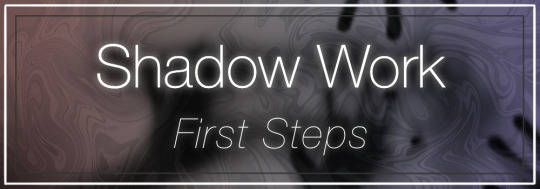
Title: Shadow Work: First Steps
Related Articles
Shadow Work Concepts Emanations of The Subconscious Dualities Biases in Witchcraft Finding Balance Divination Basics of Spellcasting Basics of Astral Projection Fundamentals of Energy Work Spell Design What is Witchcraft?
Important: Shadow work is in no way necessary for witchcraft. Nor should magical applications of shadow work be the crux of your self-reflection.
The concept of the shadow holds a lot of significance to most witches today. The shadow, as elucidated by Carl Jung, represents the concealed and often repressed aspects of an individual's psyche. It encompasses the less desirable qualities, such as fears, insecurities, and suppressed emotions, which are typically kept hidden from conscious awareness. Engaging in magical shadow work entails embarking upon a journey of self-discovery and self-integration, allowing individuals to explore these hidden depths in order to achieve greater personal understanding and growth. And while Jung may not have been the most savory character, his contributions were and continue to be very useful! I highly recommend looking into his ideas and how you can potentially modify them to better fit your own life.
The Shadow
The shadow, as defined and utilized in shadow work, refers to the concealed and often repressed aspects of an individual's psyche. The shadow represents the repository of thoughts, emotions, and impulses that are deemed unacceptable or incompatible with one's conscious self-image. A lot of the shadow’s characteristics are forged through traumatic experiences and manifest themselves as trauma responses. These hidden aspects of the self reside in the unconscious mind, remaining largely inaccessible to conscious awareness.
Shadow work involves a deliberate and introspective exploration of these suppressed elements. It is a process of bringing to light the aspects of ourselves that we may disown or deny, aiming to integrate them into our conscious selfhood. By engaging with the shadow, individuals gain insight into their fears, insecurities, and unresolved conflicts, shedding light on the hidden motivations behind their thoughts, emotions, and behaviors. This exploration of the shadow is not limited to psychological analysis alone. It encompasses various practices and techniques, such as magic, divination, self-reflection, journaling, therapy, and emotional intelligence development. Shadow work allows individuals to confront and confront their shadows in a compassionate and non-judgmental manner, promoting personal growth, self-acceptance, and authenticity.

Techniques for Exploring and Integrating the Shadow
One approach to delving into the depths of the shadow is through the practice of meditation. By cultivating a focused and contemplative state of mind, individuals can delve into their subconscious and uncover suppressed emotions, memories, and beliefs. Through consistent meditation practice, one can gradually bring these shadows into conscious awareness, allowing for a deeper understanding of oneself.
Rituals and spellwork can serve as transformative tools in shadow work. Rituals provide a structured framework within which individuals can confront and engage with their shadows. By employing symbolic gestures, such as the use of correspondences or ritual objects, or the implementation of astral projections and energy work, practitioners can externalize their inner struggles and navigate the complexities of their shadows in a controlled and intentional manner. Through spellwork, it is possible to influence the psyche, open up self awareness, make it easier to gain access to repressed memories, aid in inducing relaxed states, and form energetic representations of emotional states.
Archetypes and symbolism serve as potent vehicles for exploring the shadow within magical practice. Archetypes represent universal patterns and primordial images that exist within the collective unconscious. By working with archetypal energies, individuals can gain insight into their own shadows and access the transformative potential residing within them. Symbolism, too, can play a central role in shadow work, as it allows practitioners to express and explore complex emotions and experiences that may be difficult to articulate directly. By utilizing symbols, such as colors, animals, or mythological motifs, individuals can unlock the safety, self-awareness, and confidence contained within their shadows.

Magical Shadow Work
One of the primary benefits of engaging in magical shadow work is the revelation of hidden aspects of the self. By courageously diving into the shadow, individuals can shed light on the suppressed emotions, desires, and beliefs that have influenced their thoughts and behaviors. This process of self-exploration enables individuals to develop a more comprehensive understanding of their true nature, promoting authenticity and self-acceptance.
Magical shadow work also holds the potential for healing past wounds and traumas. By addressing the suppressed emotions and traumas stored within the shadow, individuals can initiate a process of emotional and psychological healing. Confronting and processing these experiences in a supportive and intentional manner allows for the release of stagnant energy and the restoration of emotional well-being. Engaging with the shadow can lead to personal transformation and empowerment. As individuals become aware of and integrate their shadows, they gain the ability to reclaim the aspects of themselves that were once repressed or denied. By embracing the full spectrum of their being, individuals unlock their true potential and experience a greater sense of wholeness and authenticity.
Before engaging in magical shadow work, It would be wise to approach it mundanely first. At the very least, mundane shadow work will give you an idea of what your shadow is, the shape of it, its reactionary patterns, its roots. Without mundane shadow work, or a very experienced healer, you’ll be flying blind. Shadow work is an intimate process of getting refamiliarized with the sum total of your being, your life. If you’re ready for magical shadow work, here are some spells that can help. (Be sure that they’re of your design for best results.)
Anti-anxiety spell candle
Spell to remember dreams
Spell to make accessing sensitive memories easier
Binding your own trauma response (temporarily)
Cord cutting (Actual cord cutting, not that candle & string tiktok bs)
Glamour for self-love and acknowledgement
Reveal truth spell
I may write some spells for this purpose, If I do, I will link them here in this section.

Mundane Shadow Work
Mundane shadow work refers to the process of exploring and integrating the hidden aspects of the self from a psychological and self-care perspective, without invoking supernatural or metaphysical beliefs. It involves delving into the unconscious patterns, beliefs, and behaviors that shape an individual's thoughts and actions; as well as taking the time to care for yourself, even when the cost required to do so means draining yourself. Unlike magical or mystical approaches, mundane shadow work focuses on psychological principles and practices to uncover and address these hidden aspects.
From a psychological standpoint, mundane shadow work involves examining the unconscious patterns and behaviors that influence an individual's life. The unconscious mind plays a vital role in shaping thoughts, emotions, and actions, often driven by deep-seated fears, unresolved conflicts, and unacknowledged desires. By exploring and understanding these unconscious elements, individuals can gain insight into the underlying motivations and dynamics that affect their daily lives. Mundane shadow work also involves exploring the impact of childhood conditioning and societal influences on one's personality and behavior. Early experiences and societal norms can shape beliefs, values, and attitudes that may be limiting or detrimental. Through introspection and analysis, individuals can identify and challenge ingrained patterns and beliefs that no longer serve their personal growth and well-being.
Self-reflection and journaling are effective practices for mundane shadow work. Taking time to reflect on thoughts, emotions, and experiences can help uncover hidden patterns and gain insight into one's motivations and reactions. Writing in a journal allows for a deeper exploration of thoughts and feelings, enabling individuals to recognize recurring themes, triggers, and patterns in their lives.
Self-care can serve as a valuable tool for shadow work, facilitating the exploration and integration of hidden aspects of the self. By engaging in self-care practices, individuals create a nurturing and supportive environment that allows for deep introspection and personal growth.
Examples of self-care as a form of shadow work include:
1. Mindfulness and Meditation: Practicing mindfulness cultivates awareness of one's thoughts, emotions, and sensations, creating a space for acknowledging and exploring the shadow. Meditation provides an opportunity to observe and process unconscious patterns and emotions that may arise during the practice.
2. Journaling and Reflection: Writing in a journal encourages self-reflection and can help uncover hidden aspects of the self. By expressing thoughts, emotions, and experiences on paper, individuals gain insights into their shadows and can identify recurring patterns or triggers.
3. Self-Compassion and Self-Acceptance: Embracing self-compassion and self-acceptance involves acknowledging and accepting all aspects of the self, including the shadow. By practicing self-compassion, individuals can foster a non-judgmental and nurturing attitude towards themselves, creating space for healing and growth.
4. Emotional Regulation and Boundaries: Developing emotional regulation skills allows individuals to navigate and process challenging emotions that may arise during shadow work. Setting boundaries helps establish a safe and supportive environment, protecting one's well-being and allowing for focused introspection.
5. Rest and Relaxation: Prioritizing rest and relaxation is essential for replenishing energy and fostering emotional well-being. Taking breaks, engaging in hobbies, and practicing self-care rituals such as baths or massages create a conducive environment for self-exploration and introspection.
By incorporating self-care practices into one's routine, individuals can enhance their well-being while simultaneously engaging in shadow work. These practices create a nurturing space for deep reflection, emotional processing, and personal growth. Self-care as a form of shadow work enables individuals to develop a deeper understanding and acceptance of their shadows, leading to greater self-awareness and integration.
Engaging in therapy or counseling is a valuable approach to mundane shadow work. Mental health professionals provide a supportive and objective environment where individuals can explore their unconscious patterns, childhood conditioning, and societal influences. Therapeutic techniques, such as psychodynamic therapy or cognitive-behavioral therapy, can aid in uncovering and addressing underlying issues, facilitating personal growth and transformation.
Developing emotional intelligence is another crucial aspect of mundane shadow work. Emotional intelligence encompasses the ability to identify, understand, and manage one's own emotions, as well as the emotions of others. By enhancing emotional awareness and regulation, individuals can gain insight into their unconscious emotional reactions and learn healthier ways of expressing and processing emotions. Practices such as mindfulness meditation, emotional regulation exercises, and empathy-building activities contribute to the development of emotional intelligence.
Mundane shadow work is an integral part of personal growth and self-actualization. By exploring and integrating the hidden aspects of the self, individuals can achieve a deeper understanding of their motivations, desires, and fears. This process fosters self-acceptance, self-compassion, and a greater sense of authenticity. Through mundane shadow work, individuals gain the opportunity to transform limiting beliefs, heal emotional wounds, and cultivate healthier relationships with themselves and others.

Similarities and Differences between Magical and Mundane Shadow Work
Magical and mundane shadow work share common goals and principles despite their different approaches. Both seek to explore and integrate the hidden aspects of the self, acknowledging the existence of unconscious patterns and behaviors that influence thoughts and actions. The shared goal is to achieve personal growth, self-awareness, and transformation. Both approaches recognize the importance of addressing suppressed emotions, traumas, and limiting beliefs for healing and achieving a more authentic and fulfilling life.
Magical shadow work often involves metaphysical or spiritual practices and rituals, whereas mundane shadow work focuses on psychological principles. In magical shadow work, practitioners may utilize meditation, visualization, energy work, rituals, and working with archetypes and symbolism.
In contrast, mundane shadow work primarily relies on psychological approaches supported by scientific research. It emphasizes self-reflection, introspection, therapy, and emotional intelligence development. Techniques such as journaling, therapy, and emotional regulation exercises are used to explore and understand unconscious patterns, childhood conditioning, and societal influences. Mundane shadow work seeks to integrate psychological principles and evidence-based practices for personal growth and transformation. Mundane shadow work can also use symbolism and work with archetypes. The shadow is an archetype, a subcategorization of the psyche.
While magical and mundane shadow work have contrasting approaches, they also have complementary aspects that can be integrated for an approach to self-discovery and growth. Practitioners can incorporate psychological techniques into magical shadow work. For instance, individuals can use self-reflection and journaling to deepen their understanding of the symbolism and archetypes encountered in magical practices. This integration can provide a psychological framework for exploring and processing the experiences and insights gained from themagical, mystical, and metaphysical practices, enhancing self-awareness and personal growth. In mundane shadow work, practitioners can draw inspiration from the use of symbolism and archetypes in magical practices. Symbolism and archetypes provide a rich language for exploring and expressing complex emotions, experiences, and unconscious patterns. By incorporating these symbolic elements into therapy or counseling, individuals can tap into a deeper layer of self-understanding and facilitate transformative healing processes.
Both magical and mundane shadow work recognize the importance of the mind-body connection in personal growth. Engaging in practices such as meditation, mindfulness, or breathwork can foster a deeper connection with the self and facilitate emotional and psychological healing. This mind-body integration can bridge the gap between magical and mundane approaches, emphasizing the interplay of thoughts, emotions, and physical sensations in the process of shadow work. Both require a level of intimacy and honesty that may be uncomfortable for those who are just starting. They both often involve reflecting on past traumas and how they are reacted to.

Choosing the Right Approach
When it comes to shadow work, it is crucial to choose an approach that aligns with individual preferences, needs, and goals. While both magical and mundane methods offer unique perspectives, it is essential to consider personal inclinations and strike a balance between the two. However, prioritizing mundane approaches for mental health considerations is of utmost importance. Without professional guidance, a practitioner may end up hurting themselves more than healing. Especially for younger practitioners.
Each individual has their own preferences and inclinations when it comes to self-exploration and personal growth. Some may resonate more with the mystical and metaphysical aspects of magical shadow work, while others may find solace and effectiveness in the practical and evidence-based approaches of mundane shadow work. It is essential to honor these individual preferences and inclinations when selecting an approach to shadow work.
Before starting shadow work, it is vital to identify personal needs, goals, traumas, boundaries, and influences. What aspects of the self do you wish to explore? Are you seeking healing from past traumas or a deeper understanding of your unconscious patterns? Understanding your specific needs and goals can help determine the most suitable approach for your shadow work journey. Finding a balance between magical and mundane approaches can provide a well-rounded and comprehensive experience. The metaphysical aspects of magical shadow work can offer a sense of awe, wonder, and connection to something greater than oneself. On the other hand, the psychological grounding of mundane shadow work can provide a practical framework for understanding and integrating the shadow. By incorporating elements from both approaches, individuals can tap into their intuition while also utilizing evidence-based practices for self-discovery and personal growth.
While both magical and mundane approaches have their merits, prioritizing mundane approaches to mental health is crucial. Mundane shadow work is rooted in psychological principles and has a strong evidence base. Engaging in therapy or counseling, utilizing psychological techniques, and focusing on emotional well-being are essential components of addressing mental health concerns. It is important to recognize that while magical shadow work may provide spiritual or mystical insights, it should not be relied upon as a sole solution for mental health challenges. By prioritizing mundane approaches to mental health, individuals can ensure they receive the necessary support and guidance from qualified professionals. Therapeutic interventions provide a safe and structured environment for exploring the depths of the shadow, addressing past traumas, and developing healthier coping mechanisms. Taking care of one's mental well-being is paramount and should not be overshadowed by the allure of magical or mystical practices alone.

How Shadow Work Enhances Magical Practice
Shadow work, with its focus on exploring and integrating the hidden aspects of the self, can significantly improve magical practice in various ways. By delving into the depths of the shadow, practitioners can enhance magical potency, deepen their connection to their own practice, and develop self-awareness regarding potential negative influences on their spellwork, metaphysics, and magical praxis.
Shadow work can enhance magical potency by addressing and transforming the unconscious patterns, fears, and limiting beliefs that may hinder the effectiveness of magical practice. When practitioners engage in shadow work, they uncover and work through these hidden aspects, allowing them to reclaim personal power and align their intentions and energies more effectively. By integrating the shadow, practitioners can cultivate a greater sense of authenticity, clarity, and focus, thereby magnifying the potency of their magical endeavors.
Shadow work offers a unique opportunity to deepen the connection one has to their own magical practice. By exploring the depths of the shadow, practitioners gain insights into their motivations, desires, and fears that may unconsciously influence their magical workings. This self-exploration allows practitioners to align their magical practice with their true selves, fostering a deeper sense of connection, purpose, and resonance. By integrating the shadow, practitioners can cultivate a more authentic and fulfilling magical journey.
Engaging in shadow work helps practitioners become self-aware of potential negative influences on their spellwork, metaphysics, and magical praxis. The shadow, with its hidden and repressed aspects, can manifest in unintended ways within magical practice. By exploring the shadow, practitioners can bring these influences into conscious awareness, thereby minimizing their detrimental effects. This self-awareness enables practitioners to identify and address biases, unresolved traumas, and unacknowledged emotions that may impact their magical workings. By integrating the shadow, practitioners can ensure that their spellwork and metaphysical understanding align with their authentic selves, promoting ethical, balanced, and effective magical praxis.
To become self-aware of the shadow's potential negative influence, practitioners can engage in regular self-reflection, journaling, and introspection. They can analyze their magical experiences, observe recurring patterns or emotional reactions, and critically evaluate their intentions and motivations. Seeking feedback from trusted peers or mentors can also provide valuable insights and help uncover blind spots or unconscious biases. By developing this self-awareness, practitioners can actively work towards minimizing negative influences and ensuring their magical practice aligns with their true values and intentions.

Tips for Shadow Work
Prepare by gathering comforting items and keeping them close by so they can be used afterwards.
Bathe afterwards (This may not be helpful if you suffer from dysphoria)
Practice regular meditation so that it becomes easier
Take notes during solo shadow work practices in order to discuss the points with a therapist.
Analyze personal biases and preconceptions to prevent them from influencing your exploration.
Understand intersectionality and how it affects your life.
Utilize symbols and archetypes without ascribing unnecessary magical attributes to them.
Cultivate emotional awareness, empathy, and self-regulation.
Seek information from various disciplines, including psychology, history, and ethics, and apply critical thinking to what you read.
Stay open to different viewpoints and be willing to modify your beliefs as you learn.
Dedicate time to reflection and self-assessment to facilitate growth.
Strive for authenticity rather than attempting to conform to any particular spiritual or magical tradition.
Understand your limits and maintain healthy boundaries in your practices.
Recognize that tools and accessories can aid practice but are not inherently magical. They only serve to support headspace.
Share your findings and thoughts with a professional for feedback.
Recognize the cultural origins of various practices and treat them with respect.
Distinguish between metaphorical and literal interpretations to prevent falling into delusions, especially for those with a mental illness.
Extend compassion to yourself and others, recognizing that shadow work can be a challenging process.
Understand that shadow work leads to change, and be willing to embrace it.
Surround yourself with supportive friends, family, or community.
Keeping a journal aids in tracking progress and thoughts.
Acknowledge your responsibility for your actions and beliefs.
Understand that complex phenomena cannot be reduced to overly simplistic explanations.
Seek out primary sources when researching different traditions.
Utilize both logic and intuition in a balanced way.
Recognize how language shapes thought and be mindful of your word choices.
Understand historical practices in their proper context without romanticizing them.
Recognize the metaphorical nature of certain concepts without taking them literally.
If using substances to aid in exploration, do so responsibly and with awareness of potential risks. It is unwise to employ alcohol consumption for shadow work.
Establish a physical and emotional environment that feels safe and conducive to exploration.
Stay clear of pseudoscientific explanations and theories. Especially those originating from New Age “Spirituality”.
Understand that shadow work can be taxing and prioritize self-care.
Recognize the limits of personal understanding and be humble in your approach.
Embrace a nuanced view that avoids rigid binary classifications.
Familiarize yourself with psychological theories that pertain to consciousness and the unconscious.
Be aware of the tendency to seek information that confirms pre-existing beliefs.
Recognize the connection between body and mind and engage in physical activities that promote well-being.
Recognize and avoid superstitions that might influence rational thinking.
Understand how societal norms and constructs can shape personal beliefs and behaviors.
If using visualization, do so with an understanding of its psychological basis rather than mystical.
Recognize the multifaceted nature of human personality and experience.
Be willing to change directions in your practice if something is not working, regardless of the time and effort invested.
Establish a consistent routine that supports your shadow work practice.
Maintain a strong connection to reality, recognizing the symbolic or metaphorical nature of many spiritual or magical concepts
See if this post updated
Interested in my other articles? You can find my masterpost here.

Patron Shoutouts!
Megan Kipp Jinsu Ing Mar Cosmicauquamarie Elizabeth Ash

Thank you for your continued support! My patrons help me maintain the drive to create content and help me keep food in my pantry.
My patrons of Mystic tier and higher had access to this article a week before it was public! To see other perks of supporting me, click here!
212 notes
·
View notes